West Virginia Documents
Quitclaim Deed
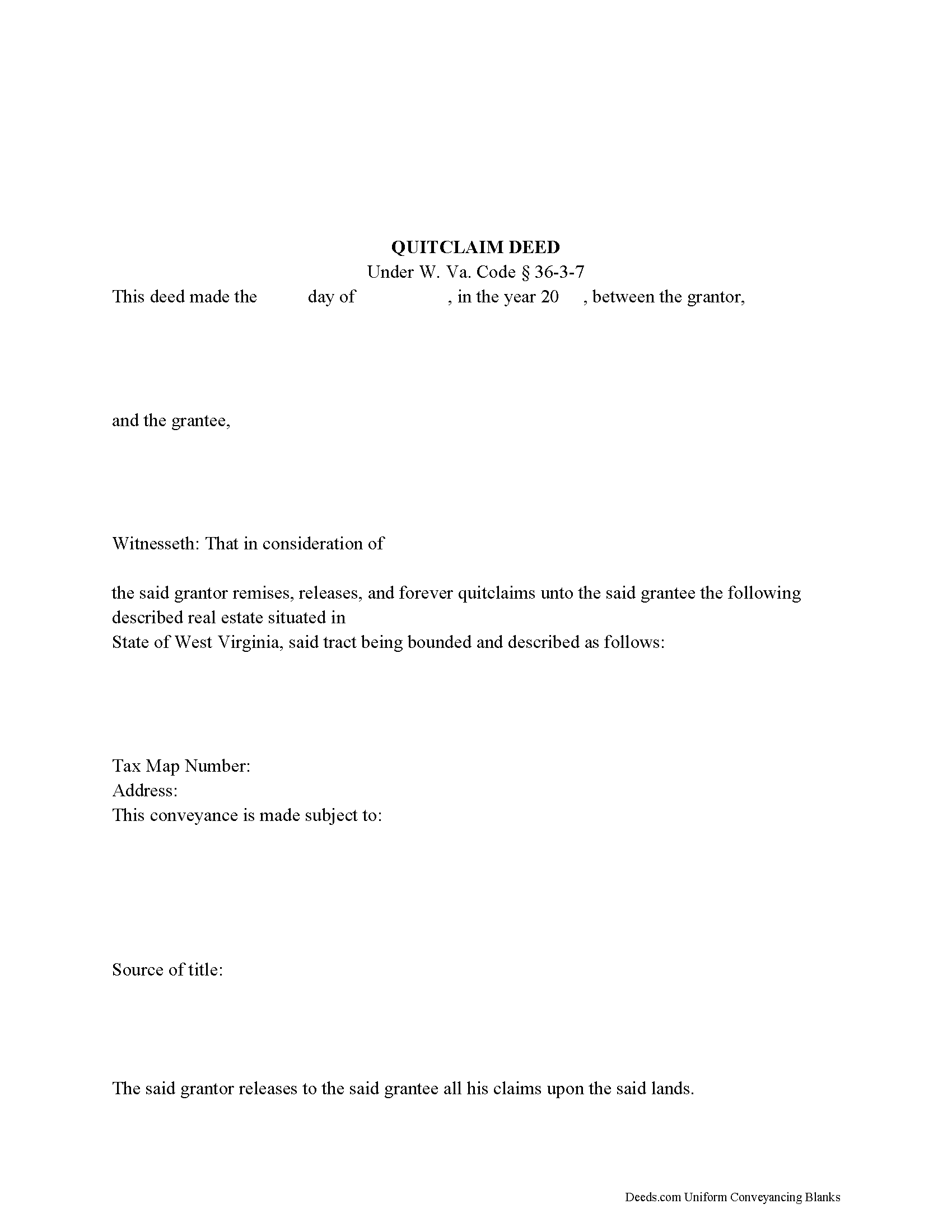
West Virginia Code Section 36-3-5 establishes a statutory form for conveying real property in West Virginia.
When a deed contains the words for release codified at Section 36-3-7, the deed is construed to convey whatever right, title, and interest the grantor has in the premises granted, "as if it set forth that the grantor or releasor hath remised, released, and forever quitted claim."
Quitclaim deeds provide the least amount of protection for the grantee (buyer) because they contain no warranty of title. A quitclaim deed, therefore, is a common manner of conveyance for clearing title or when adding or removing parties from the deed.
To be valid and to provide a quality public record, both the grantor and grantee must be named in the section of the deed that details the words and terms of conveyance (conveyancing clause). In addition, the property must be able to be identified by inclusion of a legal description, including the district in which the parcel is located.
The granting party must sign the deed in the presence of a notary public. Property owned by a married person requires the spouse's signature to release potential marital rights, regardless of whether th... More Information about the West Virginia Quitclaim Deed
Gift Deed
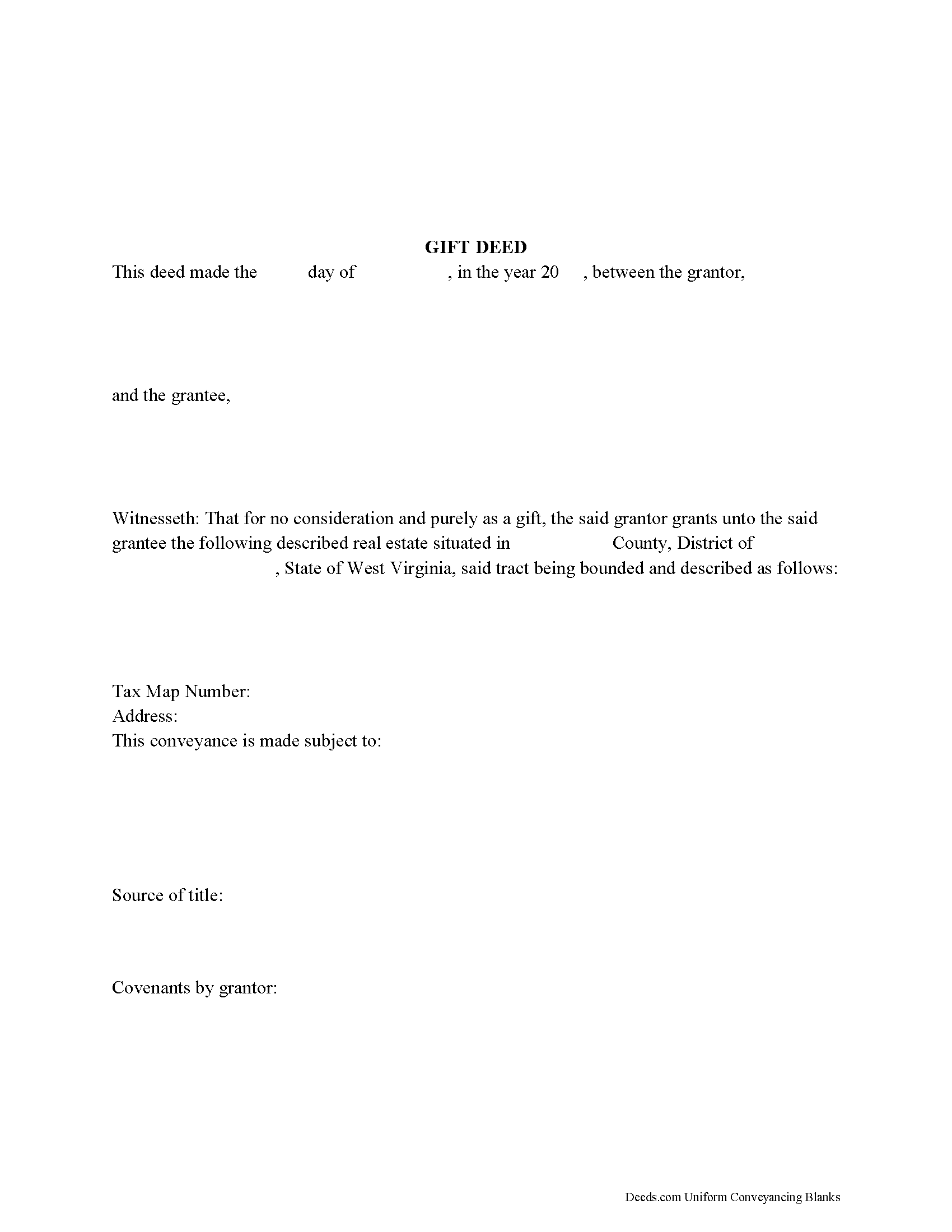
A gift deed, or deed of gift, is a legal document voluntarily transferring title to real property from one party (the grantor or donor) to another (the grantee or donee). A gift deed typically transfers real property between family or close friends. Gift deeds are also used to donate to a non-profit organization or charity. The deed serves as proof that the transfer is indeed a gift and without consideration (any conditions or form of compensation).
In order for a gift deed to be valid they must meet the following requirements: The grantor must intend to make a present gift of the property, the grantor must deliver the property to the grantee, and the grantee must accept the gift. A gift deed must contain language that explicitly states no consideration is expected or required, because any ambiguity or reference to consideration can make the deed contestable in court. A promise to transfer ownership in the future is not a gift, and any deed that does not immediately transfer the interest in the property, or meet any of the aforementioned requirements, can be revoked [1].
A lawful gift deed includes the grantor's full name and marital status, as well as the grantee's full nam... More Information about the West Virginia Gift Deed
Warranty Deed
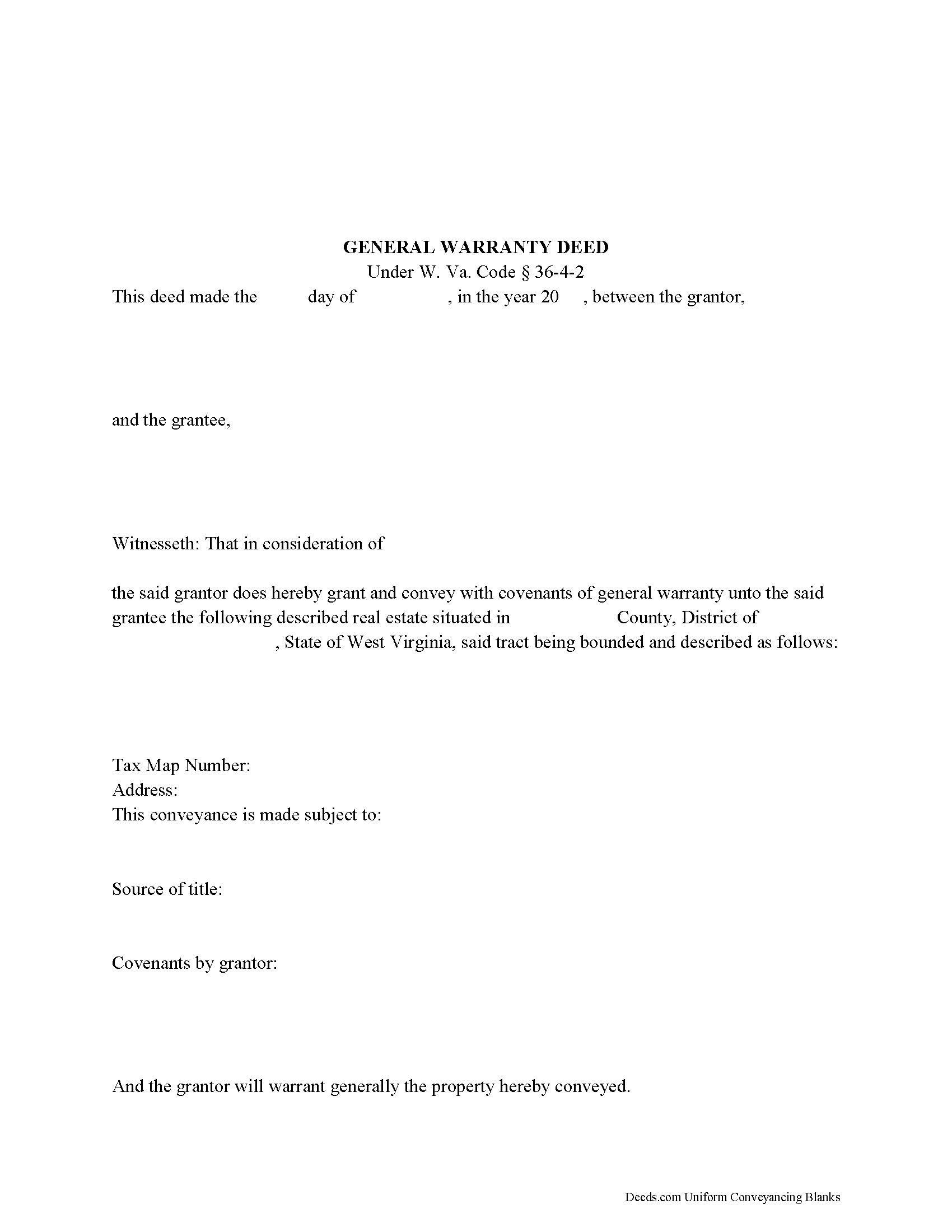
General warranty deeds are commonly used to convey real property in West Virginia. A statutory form for conveying real property is codified at West Virginia Code Section 36-3-5. When a deed contains words of general warranty under Section 36-4-2, the grantor promises to warrant and defend the property for the grantee against the claims and demands of all persons.
A general warranty deed provides the most surety for the grantee. The grantor guarantees that he received clear title from the previous owner of the property, and further guarantees that no other parties, past or present, retain an interest in the property.
In addition to the covenant of warranty, a general warranty deed can include additional statutory covenants under W. Va. Code Chapter 36, Article 4, including right to convey, quiet possession, freedom from encumbrances, and a covenant of further assurances.
To be valid and to provide a quality public record, both the grantor and grantee must be named in the section of the deed that details the words and terms of conveyance (conveyancing clause). In addition, the property must be able to be identified by inclusion of a legal description, including the district... More Information about the West Virginia Warranty Deed
Special Warranty Deed
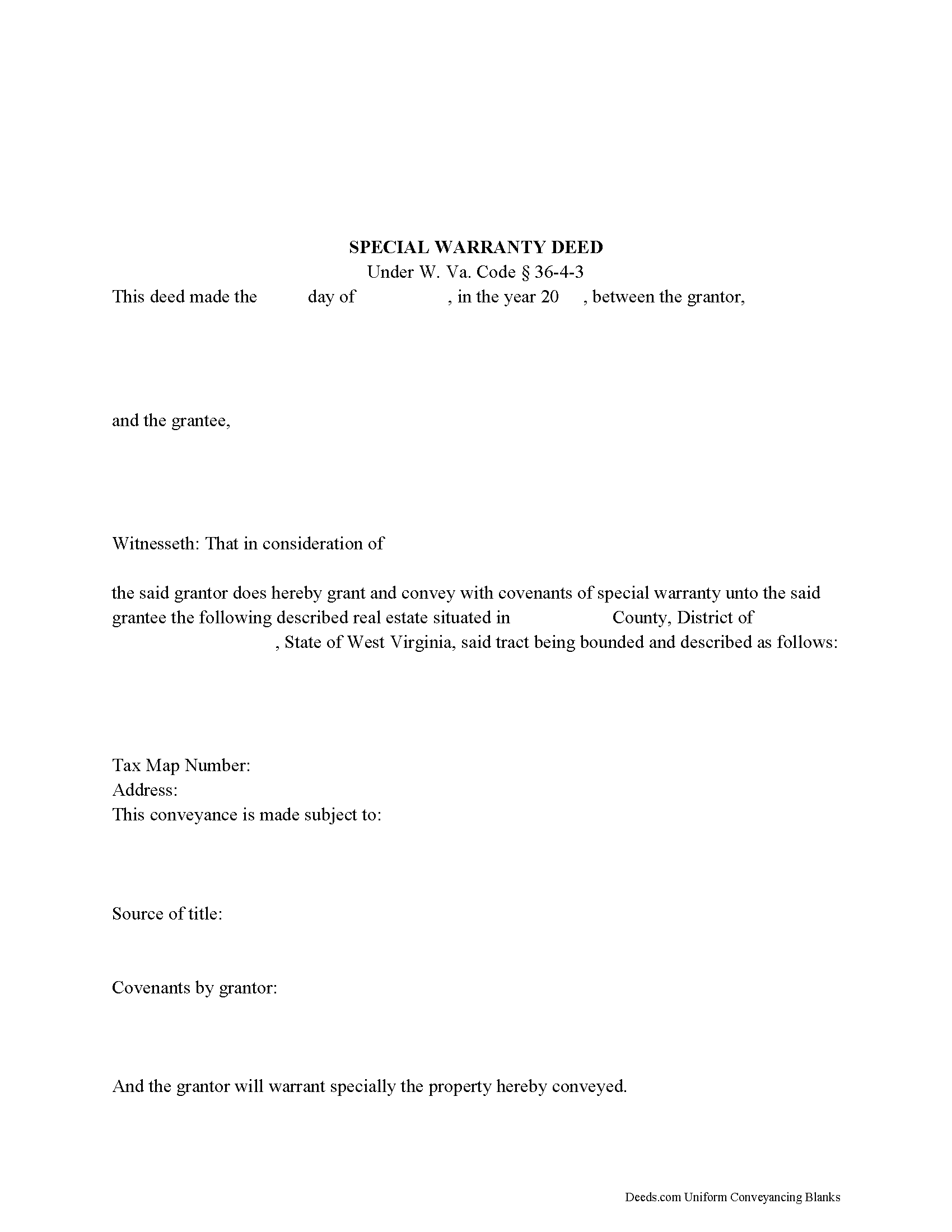
Special warranty deeds are commonly used to convey real property in West Virginia. A statutory form for conveying real property is codified at West Virginia Code Section 36-3-5. When a deed contains words of special warranty under Section 36-4-3, the grantor promises to warrant and defend the property for the grantee against the claims and demands of the grantor and all persons claiming by, through, or under the grantor.
The warranty is limited to the time the grantor held title and does not guarantee the quality of the title past the grantor's ownership. Therefore, a special warranty deed offers less protection for the buyer than a general warranty deed.
In addition to the covenant of warranty, a special warranty deed can include additional statutory covenants under W. Va. Code Chapter 36, Article 4, including right to convey, quiet possession, a special covenant against encumbrances, and a covenant of further assurances.
To be valid and to provide a quality public record, both the grantor and grantee must be named in the section of the deed that details the words and terms of conveyance (conveyancing clause). In addition, the property must be able to be identified by in... More Information about the West Virginia Special Warranty Deed
Grant Deed
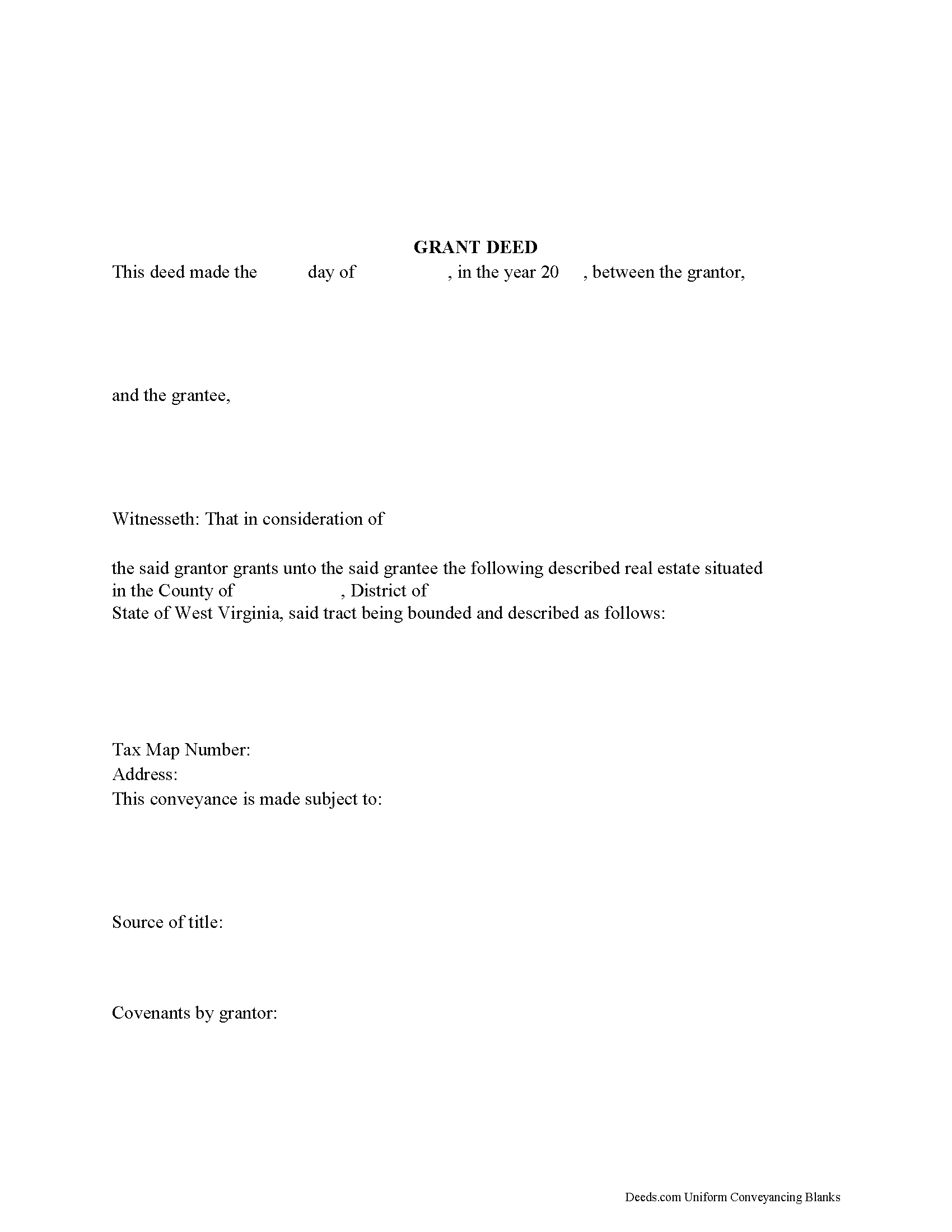
In West Virginia, title to real property can be transferred from one party to another using a grant deed.
A statutory form for conveying real property is codified at West Virginia Code Section 36-3-5, with room to customize the form as needed for the situation. Typical covenants of a grant deed include that the grantor has not previous sold the interest now being conveyed and that the premises are free from encumbrances, excepting those noted in the instrument. Statutory covenants are codified at W. Va. Code 36-4, and require specific language in the body of the deed.
To be valid and to provide a quality public record, the section of the deed that details the words and terms of conveyance (granting clause) must name both the grantor and grantee. It also includes a legal description detailed enough to identify the specific parcel within its district.
The granting party must sign the deed in the presence of a notary public. Property owned by a married person requires the spouse's signature to release potential marital rights, regardless of whether the spouse holds a direct interest in the property.
Deeds in this state are void as to creditors and subsequent purchasers ... More Information about the West Virginia Grant Deed
Correction Deed
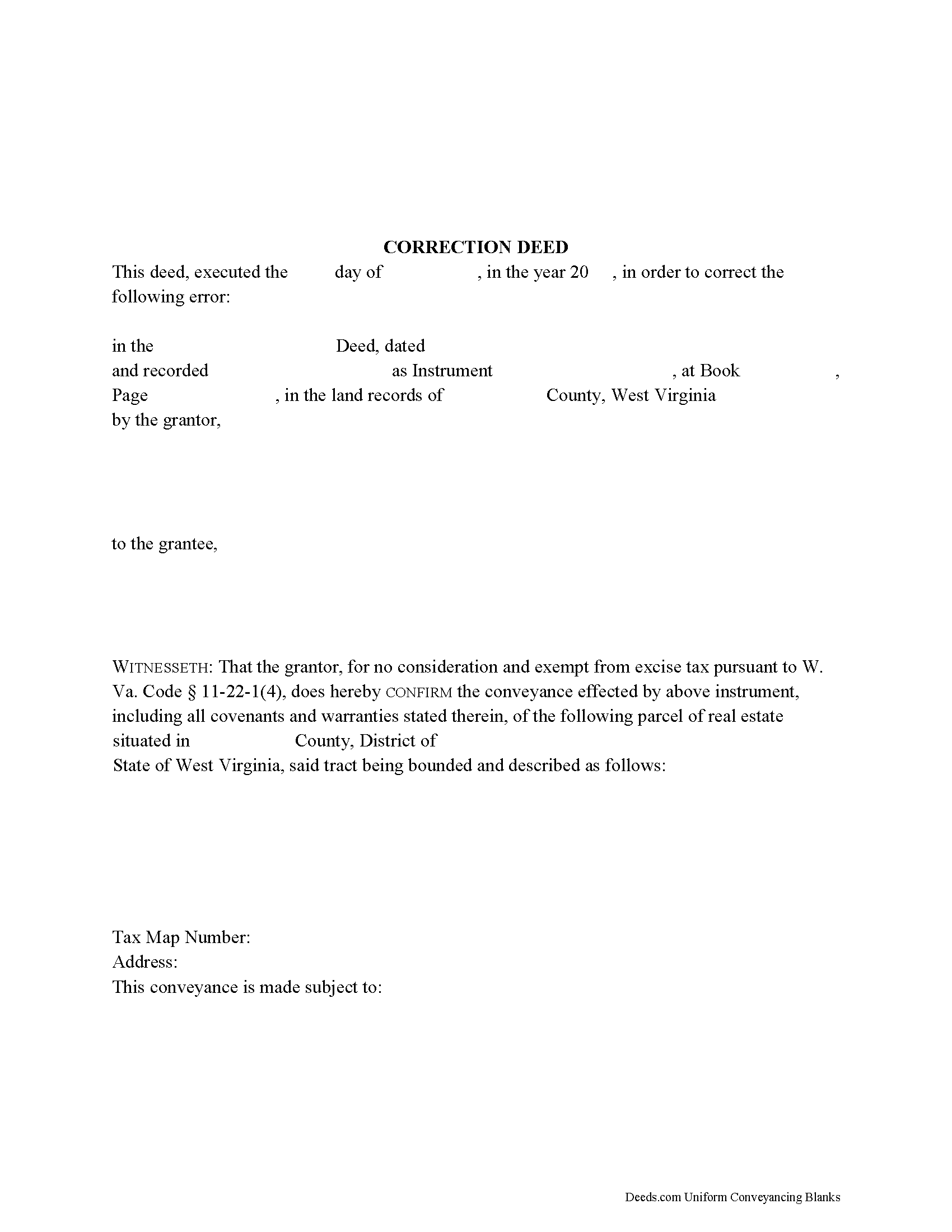
Use the correction deed to amend a previously recorded warranty, special warranty, or quitclaim deed.
A correction deed explains and corrects an error in a prior instrument. As such, it passes no title, but confirms the conveyance effected by the previously recorded document. It must be executed from the original grantor to the original grantee, and it must be recorded in order to be legally valid.
The correction deed should reference the prior conveyance by type of error, date of execution, date of recording, as well as by recording number and location. Beyond that, it restates the information given in the prior deed, thus serving as its confirmation. The original instrument remains on record as well.
Deeds of correction are most appropriate for minor errors and omissions in the original deed, such as misspelled names, omission of marital status, or typos in the legal description. If an error has the potential to cloud the title and affect its future transfer, recording a correction deed will help.
More substantial changes, such as adding a name to the title or adding/subtracting a portion of land to the legal description of the property, usually require a new deed of... More Information about the West Virginia Correction Deed
Deed of Trust and Promissory Note
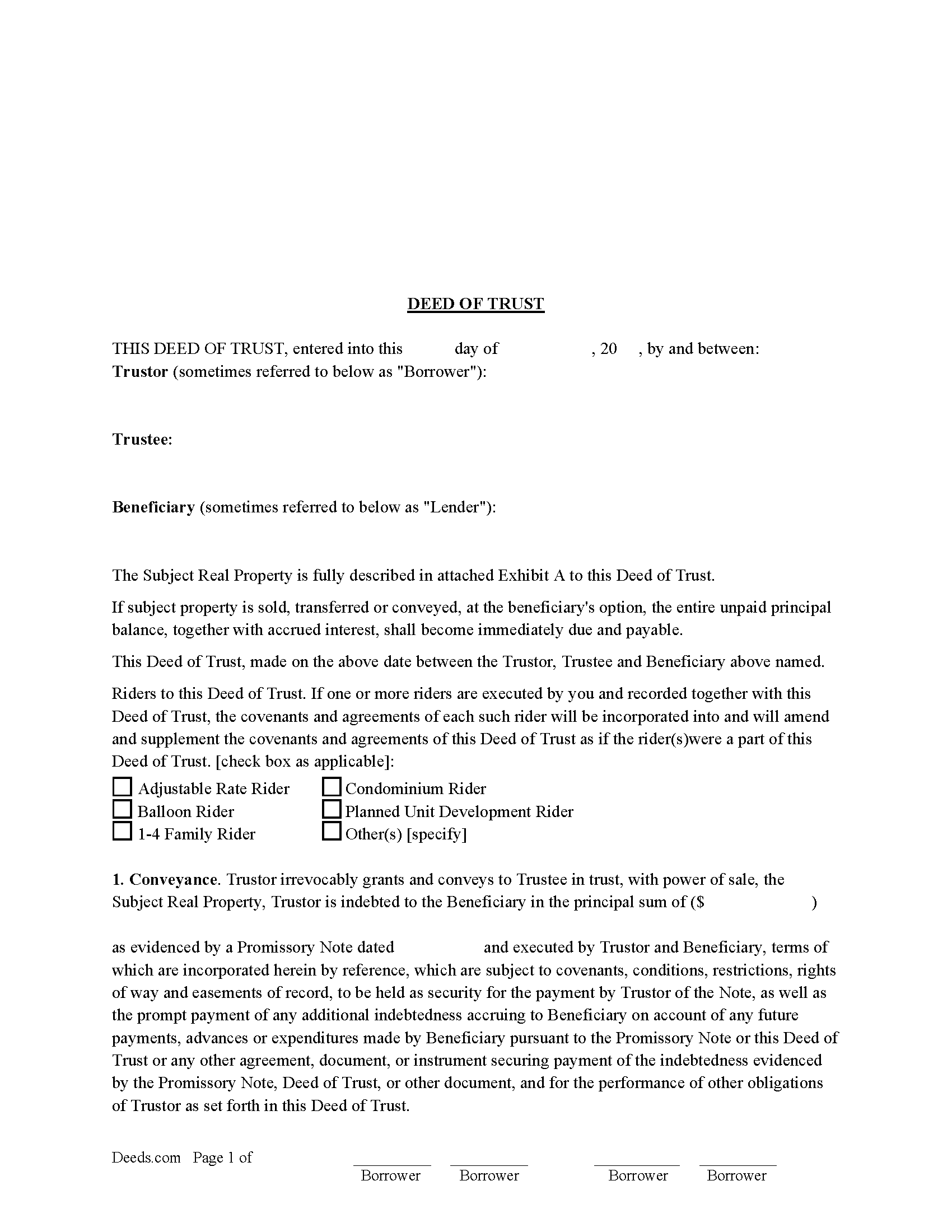
There are three parties in this Deed of Trust:
1- The Trustor (Borrower)
2- Beneficiary (Lender) and a
3- Trustee (Neutral Third Party)
Basic Concept. The Trustor (Borrower) conveys property title to a Trustee (Neutral Party). A Trustee or beneficiary/Lender can take action against any person for damages.
In West Virginia, a Deed of Trust (DOT) is the most commonly used instrument to secure a loan. If the DOT has a "Power of Sale" clause, foreclosure can be done non-judicially, saving time and expense, because the trustee doesn't require the court's involvement. This process is called a Trustee Sale. Explained in WV Statute 38-1-3. "Sales under trust deeds."
Proceeds of Trustee Sale: After deducting all costs, fees and expenses of Trustee and of this trust, including the cost of evidence of title in connection with the sale and reasonable attorney's fees, trustee shall apply the proceeds of sale to payment of all sums then secured hereby and all other sums due under the terms hereof, with accrued interest, and the remainder, if any, to the persons legally entitled thereto or as provided by W. VA. ARTICLE 1, 38-1-7.
(38-1-2. Form of deed of trust; memorandum of deed of t... More Information about the West Virginia Deed of Trust and Promissory Note
Release of Deed of Trust
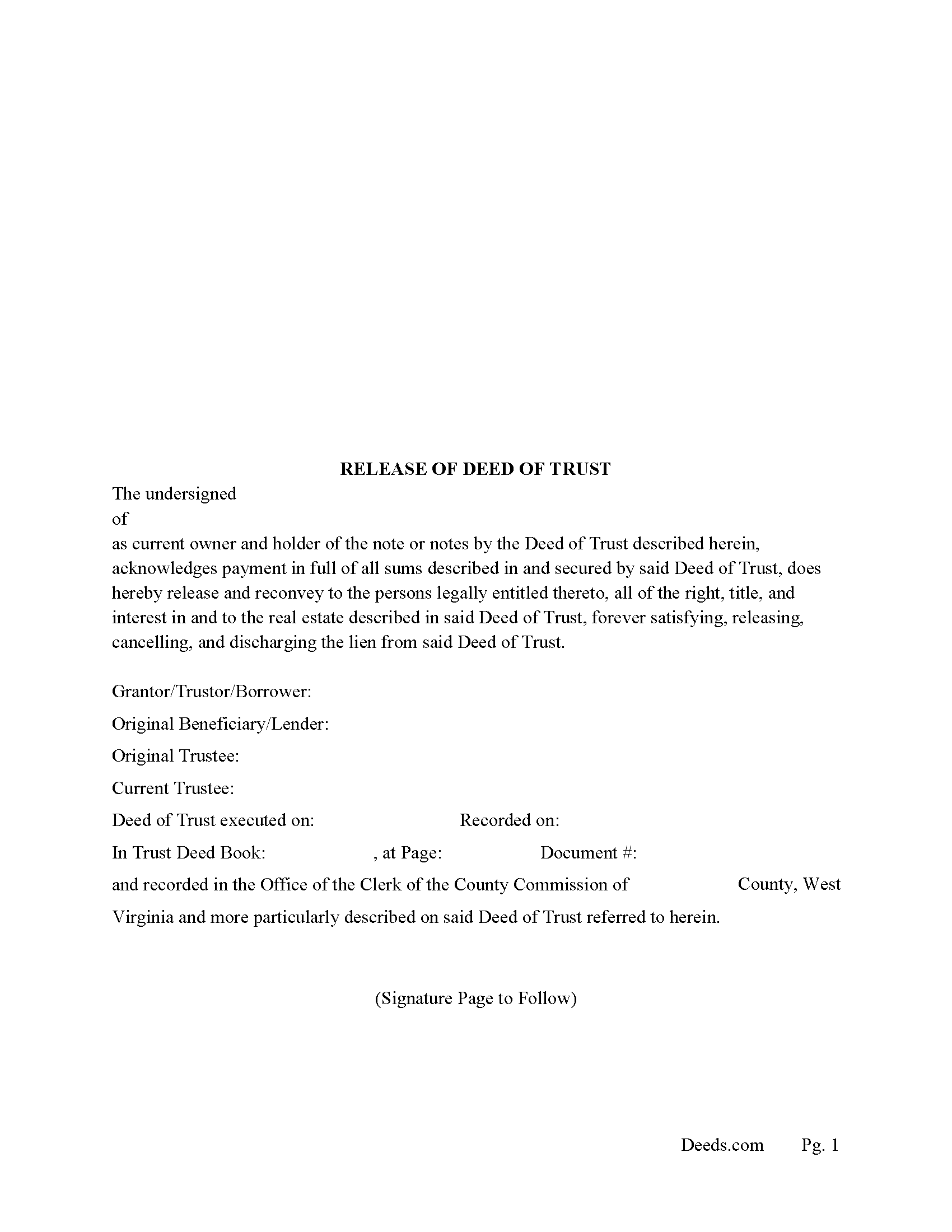
In West Virginia a Deed of Trust can be released by a Beneficiary/Lender or by a Trustee. This form is used by the current Lender, holder of the note or notes. For use when the note or notes have been satisfied and a full release is required. (Such release shall be executed and furnished to the debtor within thirty days after the debt has been satisfied.) (WV. Article 12. 38-12-1) (a))
Such release of lien shall be executed by the lienholder and acknowledged before the clerk of the county commission in whose office the lien is recorded or before such other person authorized to take acknowledgments of deeds. Such written release shall be deemed sufficient if it describes the lien to be released by any words that will identify and show an intent to discharge the same. Releases may also be made according to the provisions of section two of this article. (WV. Article 12. 38-12-1) (b))
38-12-8. Recordation of release; effect.
When the release has been so signed and acknowledged, it may be presented for record to the clerk in whose office the lien thereby intended to be released is recorded or docketed, and from and after the time the same is so left for record (which time the cle... More Information about the West Virginia Release of Deed of Trust
Easement Deed
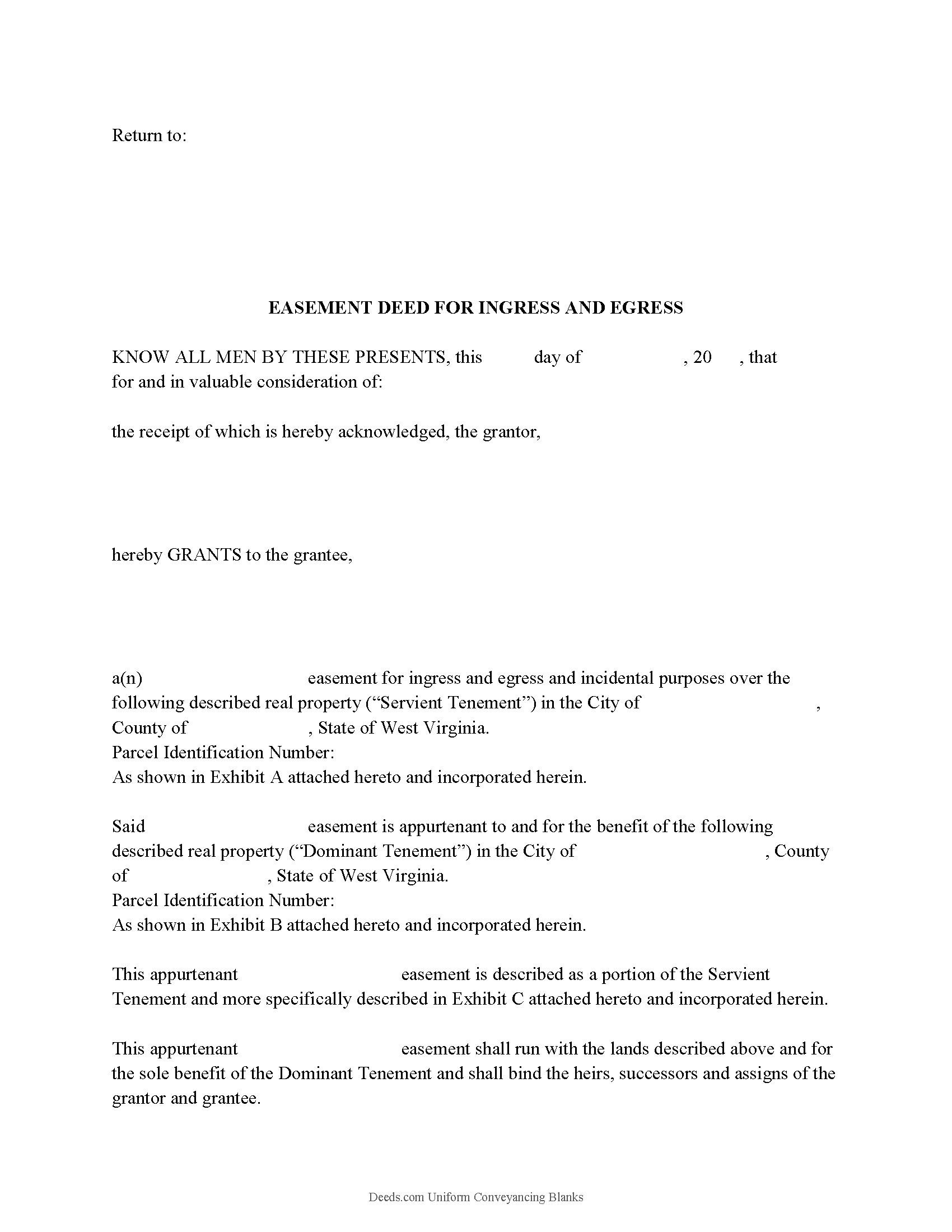
An easement deed can be created to allow one person the right to use another's land for a specific purpose. An easement is a non-possessory interest in land. Unless an exception is made, every deed conveying real property in West Virginia will be construed to include all buildings, privileges, and appurtenances of every kind belonging to the lands conveyed (36-3-10). Any real estate deed or instrument in this state that initially grants or reserves an easement or right-of-way should describe the easement or right-of-way by metes and bounds, or by specification of the centerline of the easement, or by reference to an attached drawing or plat which may not require a survey (36-3-5a).
In order to be admitted to record in West Virginia, an easement deed must be signed by the grantor and acknowledged or proved by two witnesses (39-1-2). An easement deed must have a certificate of acknowledgment attached to the deed or written on it that has been made before the president of a county court, a justice of the peace, notary public, recorder, or clerk of any court within the United States (39-1-3). Easement deeds can be acknowledged in West Virginia or in another state. If an easement de... More Information about the West Virginia Easement Deed
Termination of Easement
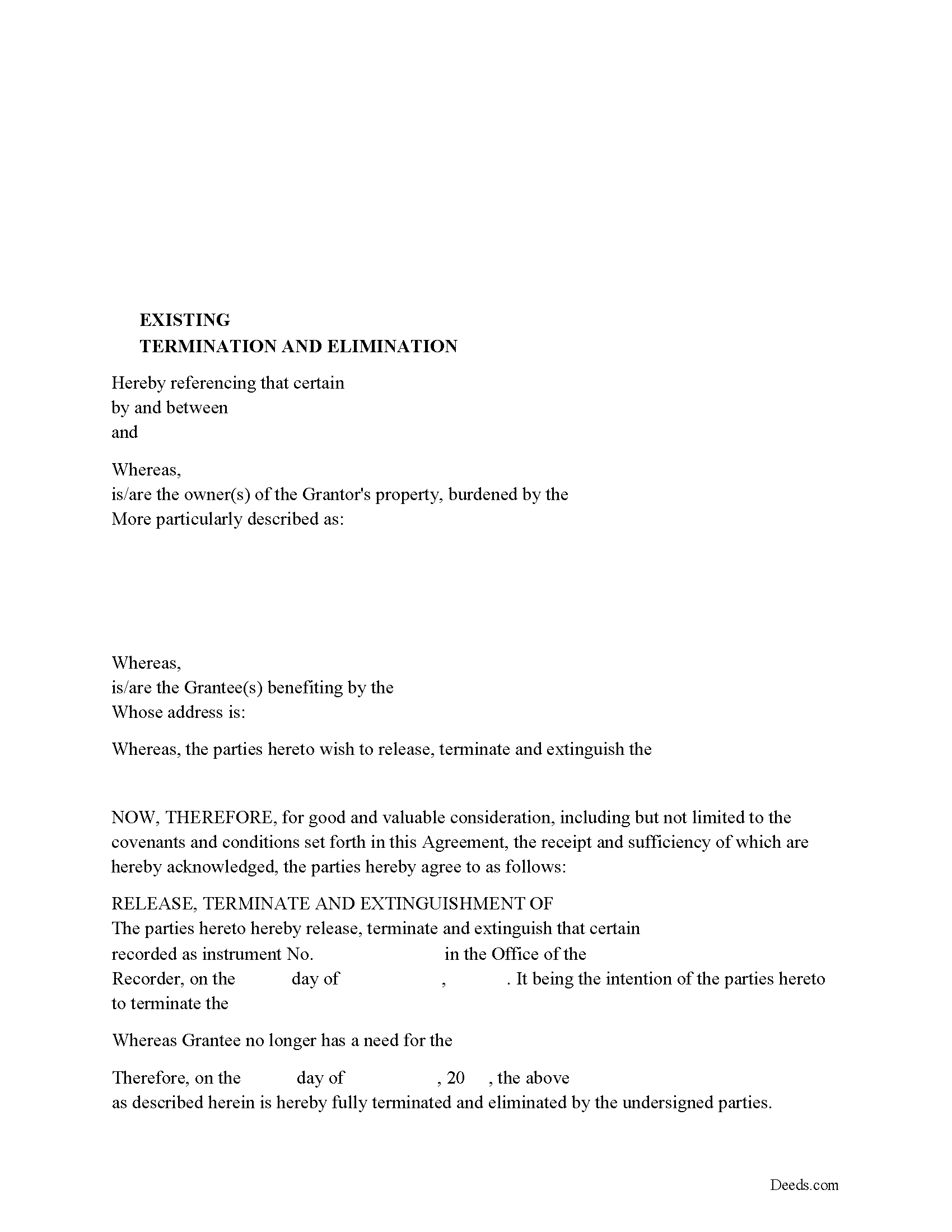
Use this form to release, terminate, extinguish a previously recorded document that involves access to and from a property.
Documents such as:
1. Easement Deeds or Agreements (An easement is a non-possessory interest in land, granting the right to use someone else's property for a specific purpose, like a driveway or utility line)
2. Access Roads
3. Right of Ways
4. Utility Easements (Power, Gas, Water, Sewer, Etc.)
5. Drainage Easements
This document allows the owner of the land, burdened by the access and the party that benefits from the access, to sign an agreement releasing the property from such access, ... More Information about the West Virginia Termination of Easement
Transfer on Death Deed
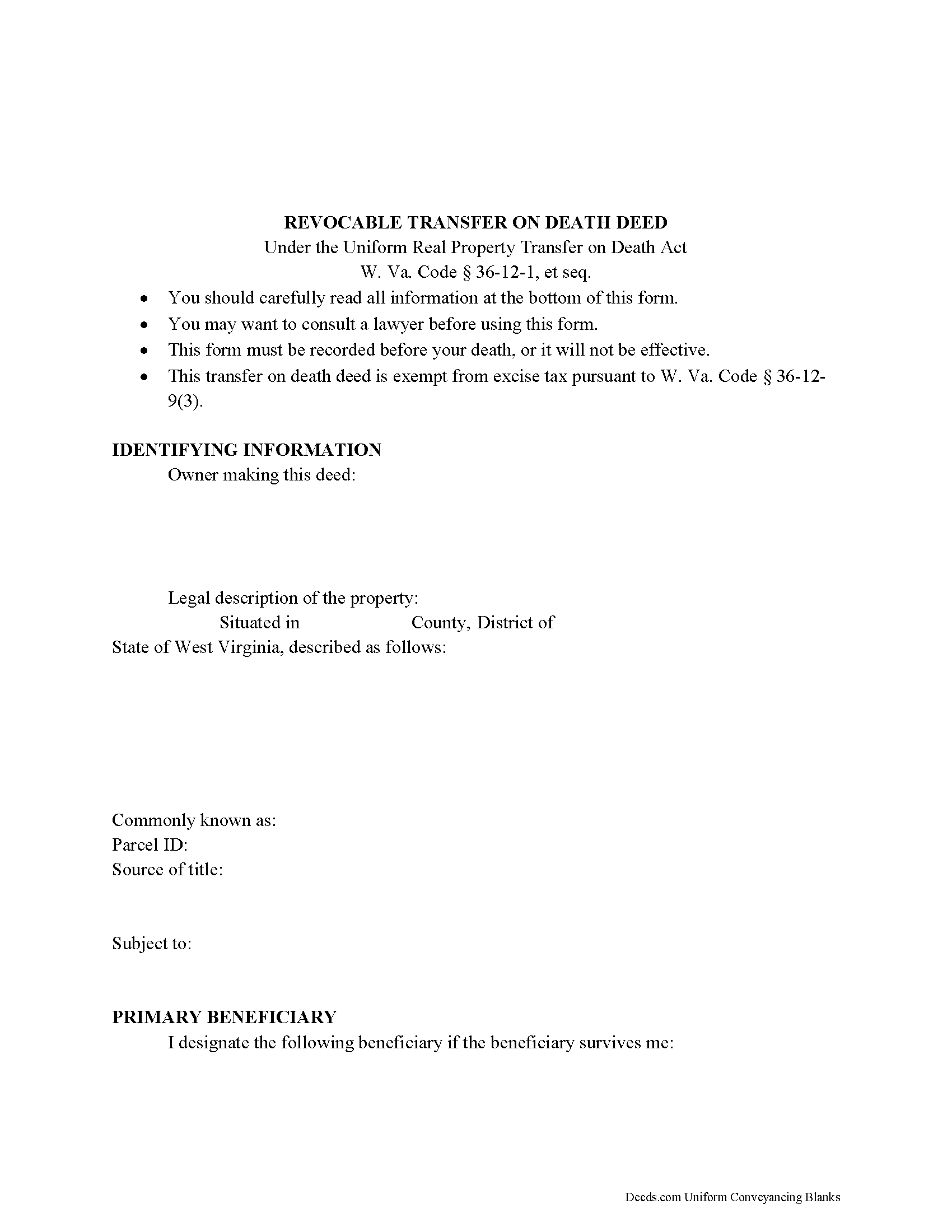
The West Virginia legislature voted to join with 13 other states and adopt the Uniform Real Property Transfer on Death Act (URPTODA). The law is found at 36-12-1 et seq in the Code of West Virginia, and went into effect on June 5, 2014. This act allows owners of real property in West Virginia to control the distribution of what is often their most significant asset, their real estate, by executing and recording a transfer on death deed (TODD).
Transfer on death deeds are non-testamentary, which means ownership of the property passes to the beneficiary without including it in a will or a need for probate (36-12-7). Still, sensible estate planning dictates that the will and the TODD should not be in conflict.
West Virginia's version of the URPTODA sets out the specific requirements for lawful transfer on death deeds:
- The capacity required to make or revoke a transfer on death deed is the same as the capacity required to make a will (36-12-8, 41-1-2).
- The transferor must be least eighteen years old; and
- Be mentally competent
- It must contain the essential elements and formalities of a properly recordable inter vivos deed, such as warranty or quitclaim deed (36-12-9... More Information about the West Virginia Transfer on Death Deed
Transfer on Death Revocation
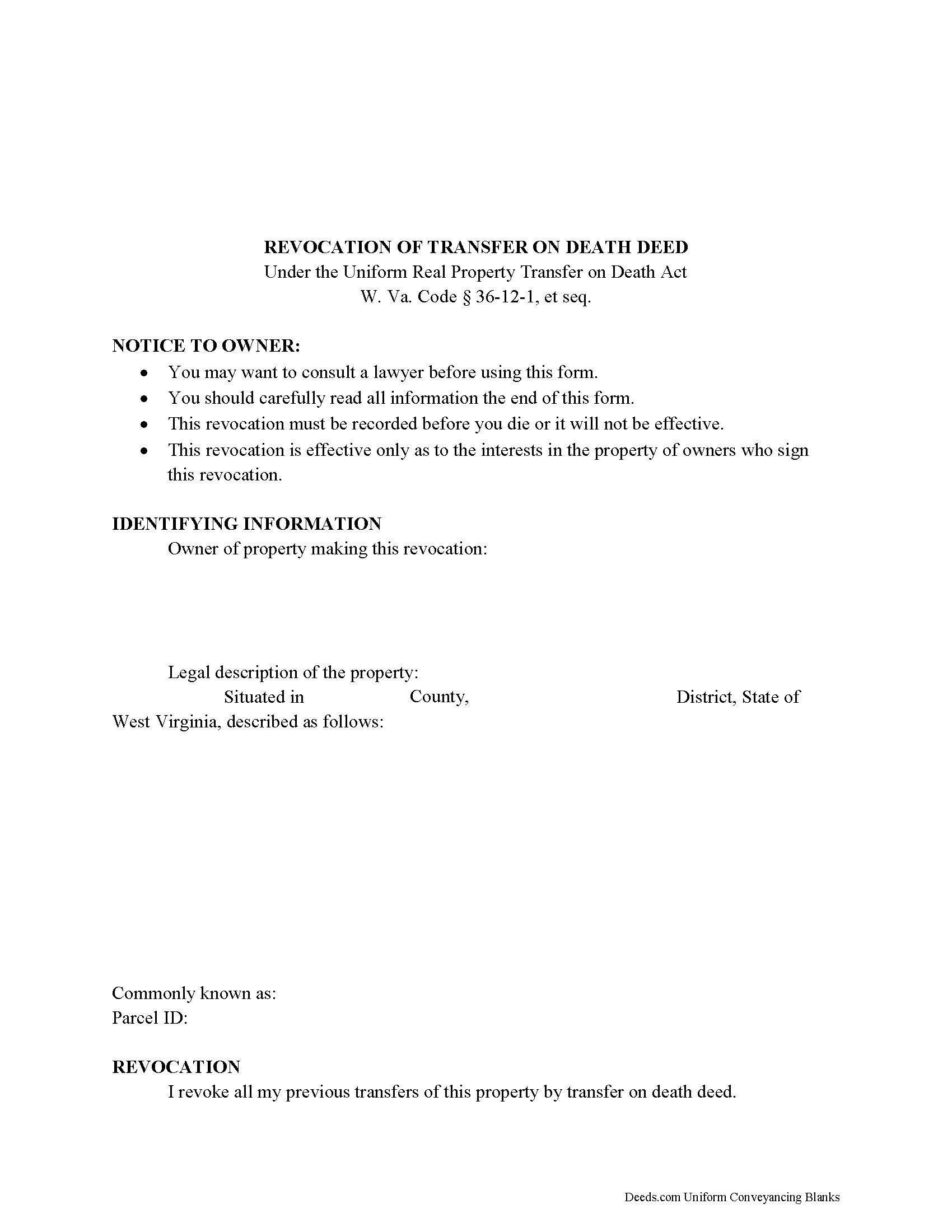
The West Virginia legislature voted to join with numerous other states and adopt the Uniform Real Property Transfer on Death Act (URPTODA). The law is found at 36-12-1 et seq in the Code of West Virginia, and went into effect on June 5, 2014. This act allows owners of real property in the state to control the distribution of what is often their most significant asset, their real estate, by executing and recording a transfer on death deed (TODD).
Revocation is an important feature of transfer on death deeds because it allows the owner/transferor to easily respond to a change in circumstances. This option is the reason that TODDs do not require consideration or notice (36-12-10). At 36-12-11, the statute outlines the three methods available for changing or revoking a recorded transfer on death deed, by executing and recording:
- A new TODD
- A revocation form
- An inter vivos deed that expressly revokes all or part of the TODD
To preserve a clear chain of title, it makes sense to file a revocation form when cancelling a previously recorded transfer on death deed because it will add an end point for the potential transfer. As a result, future title searches prior to selling... More Information about the West Virginia Transfer on Death Revocation
Affidavit of Heirship
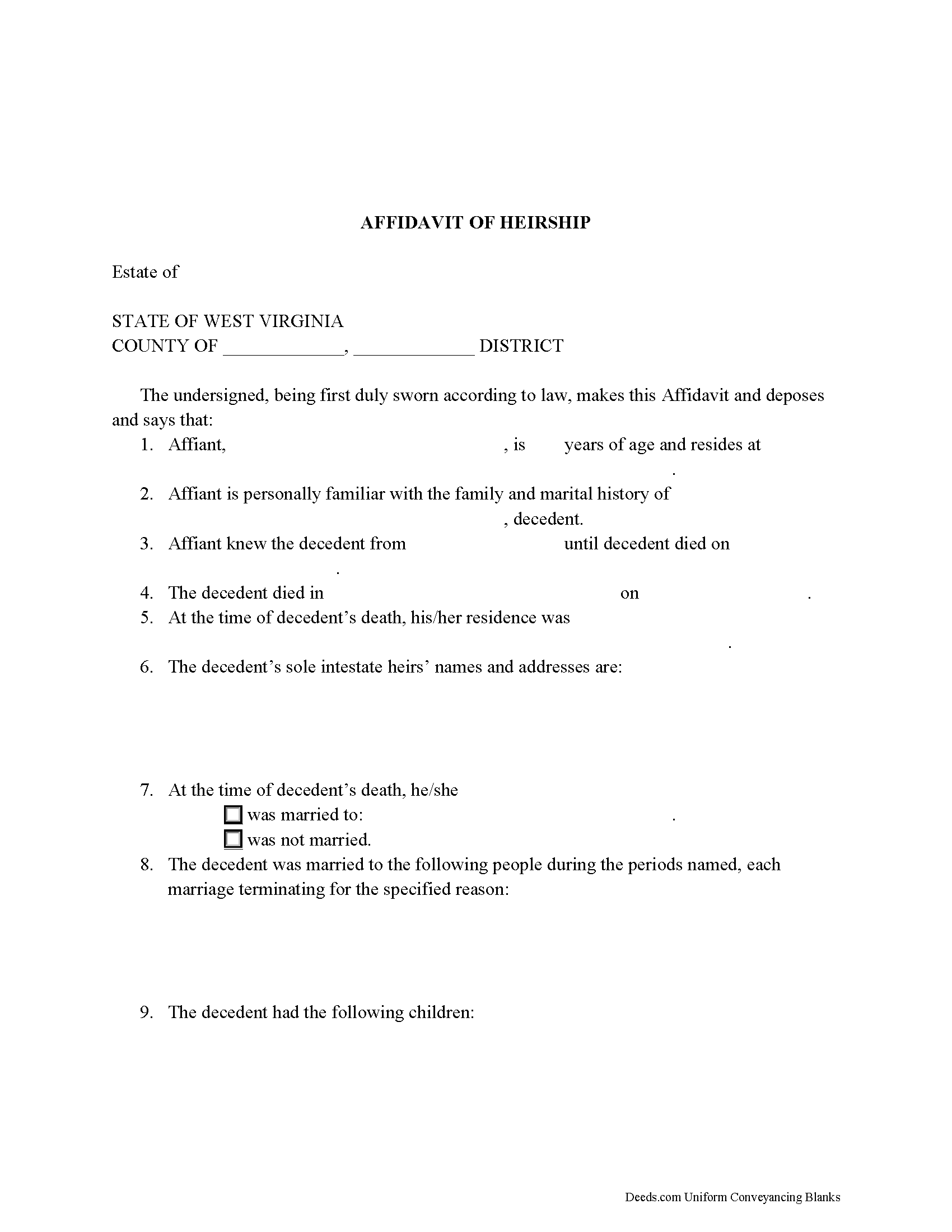
An affidavit of heirship establishes the lawful heirs of a decedent's estate when he or she dies intestate (without a will).
When recorded in the land records where the real property described within is located, the affidavit provides a record of the change in ownership and succession in interest of the within-described assets to the decedent's heir(s). The affidavit is not to be used when a will is probated or a proceeding for the administration of the decedent's estate has been opened.
While anyone can file an affidavit of heirship, the affiant, the person making the sworn statements contained in the affidavit, must have knowledge of the decedent's marital history and family tree in order to complete the affidavit accurately.
The instrument establishes the decedent's martial status at the time of death and whether the decedent left descendants (children, whether natural or adopted, and the children of any deceased child).
In West Virginia, interest in real property from a decedent's estate that does not transfer outside of probate (i.e., property not held with a survivorship designation) transfers by the laws of descent codified at W. Va. Code 42-1).
In general,... More Information about the West Virginia Affidavit of Heirship
Personal Representative Deed
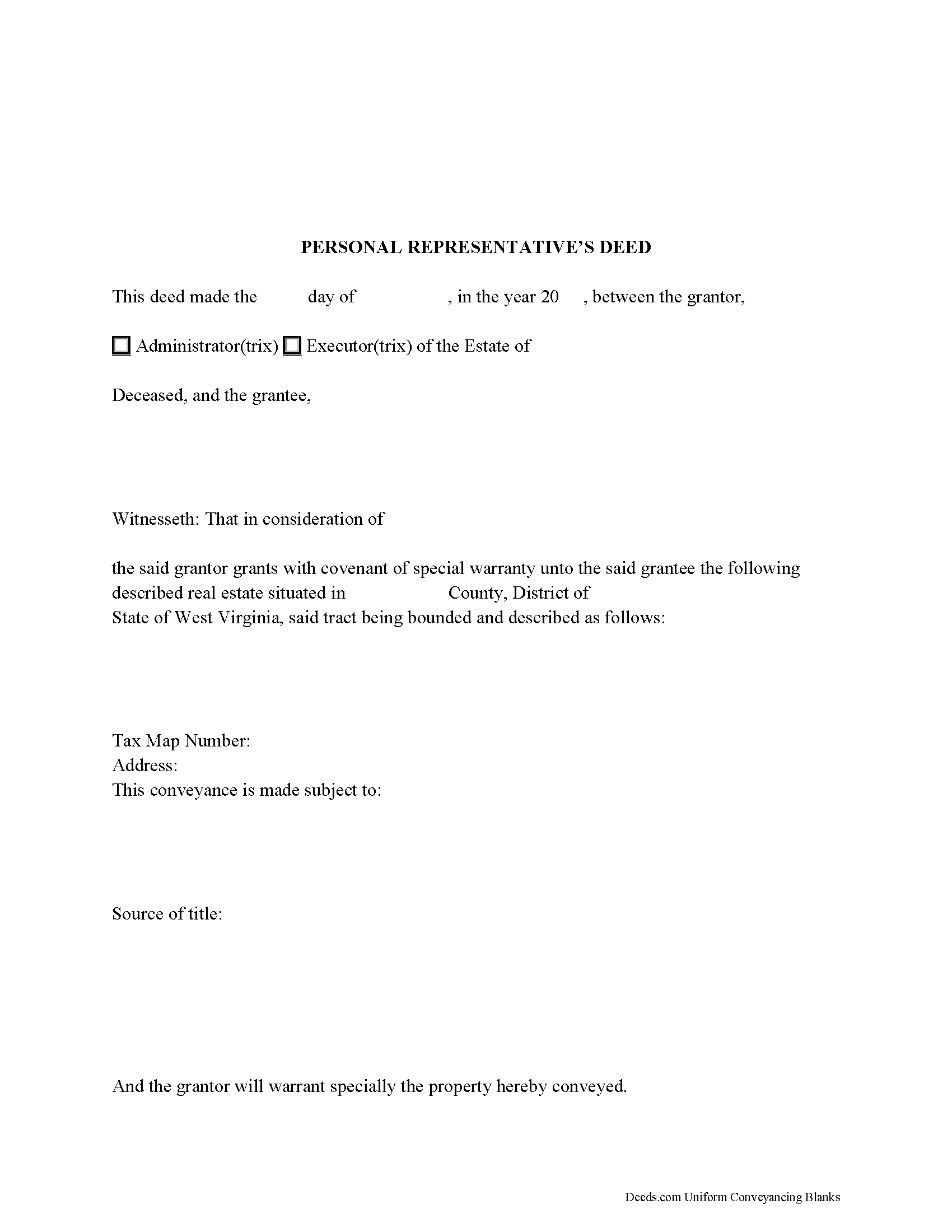
A personal representative is the fiduciary appointed to administer a decedent's estate in probate. When the decedent dies with a will, the personal representative is the executor named in the will, or, if no executor is named, a qualifying beneficiary. When the decedent dies intestate (without a will), the personal representative selected by the court is called the administrator.
In the course of estate settlement, a personal representative may be required to execute and record a deed conveying real property from the estate following a sale. A decedent may designate in their will the specific real estate to be sold, or an estate's assets may be insufficient to pay its debts, and the personal representative may need to commence a suit in equity to subject the real estate to payment under W. Va. Code 44-8-7.
A fiduciary deed follows the statutory form of a deed under W. Va. Code 36-3-5. In addition, West Virginia requires a Declaration of Consideration or Value confirming the actual consideration paid or monetary value of the property being transferred (W. Va. Code 11-22-6).
Due to the nature of the fiduciary as a representative, a special warranty is typically appropriate... More Information about the West Virginia Personal Representative Deed
Trustee Deed
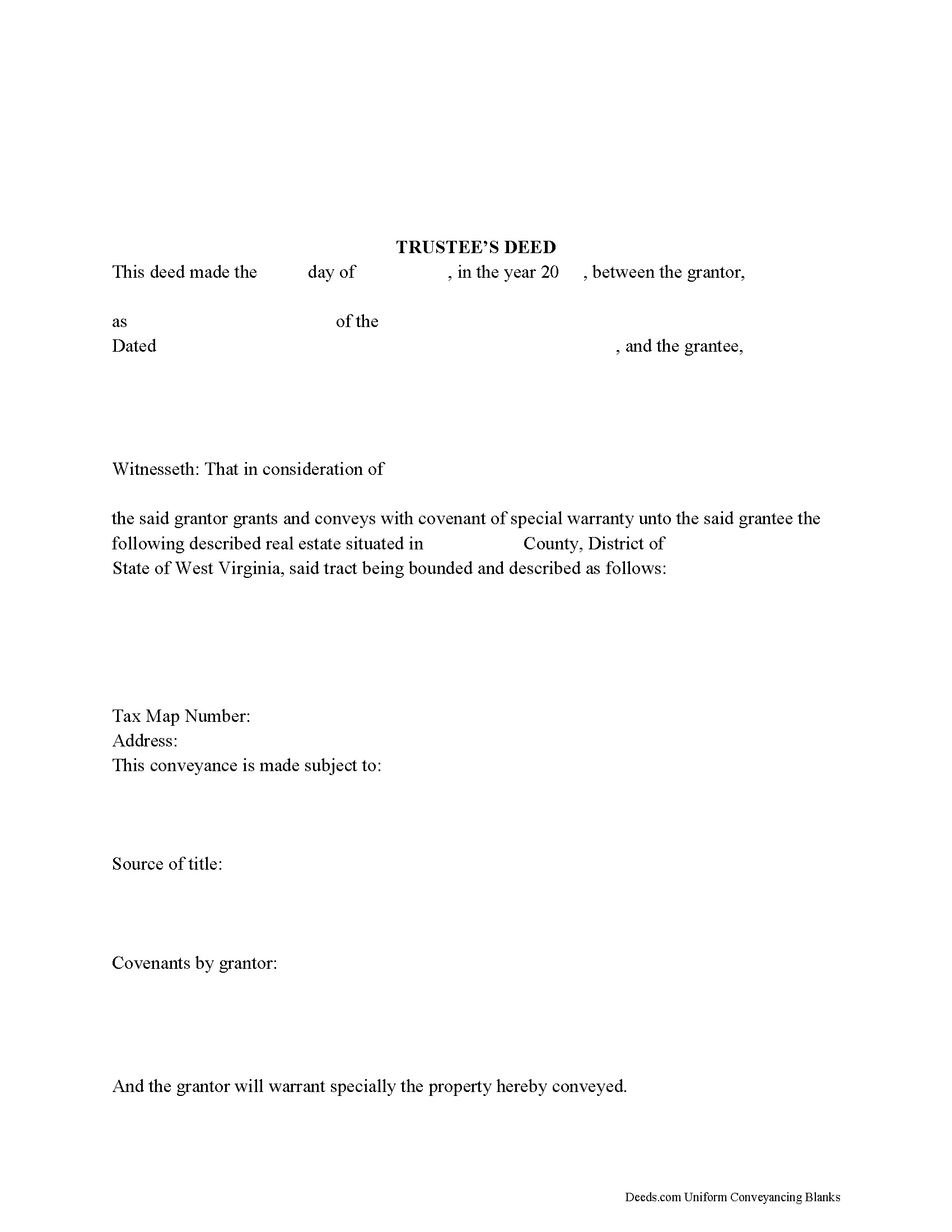
In a living trust arrangement, a settlor transfers property to another person (the trustee) for the benefit of a third (the beneficiary). The settlor establishes the trust by executing a document referred to as the trust instrument and by contributing assets to the trust. The trust instrument, generally unrecorded, contains the settlor's estate plans and dictates how the trust will be administered. In many living trust arrangements, the settlor serves as the trustee during his lifetime, and designates a successor to take over trustee duties upon his death or incapacitation.
When real property is transferred into trust, the settlor executes a deed naming the trustee as the grantee. The trustee then holds legal title to the property as the administrator of the trust. In order to convey the interest in the property from the trust, the trustee executes a trustee's deed.
The trustee's deed takes its name from the role of the executing party. In most states, deeds are differentiated and named after the type of warranty the grantor makes. In West Virginia, however, no distinction is made between different types of deeds (W. Va. Code 36-3-4).
The statutory form for deeds in Wes... More Information about the West Virginia Trustee Deed
Mineral Deed
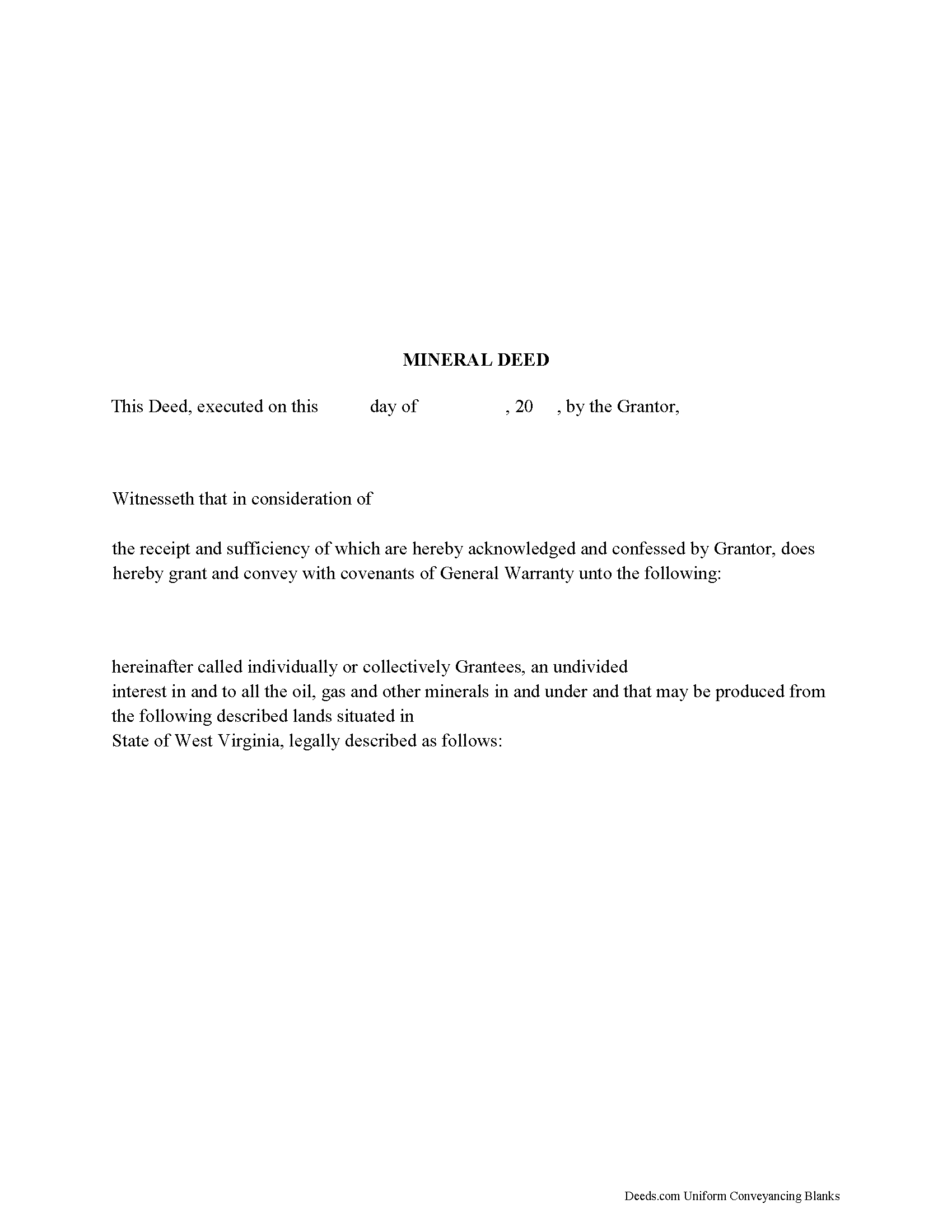
The General Mineral Deed in West Virginia transfers oil, gas, and mineral rights from the grantor to the grantee. THIS IS NOT A LEASE. There are no Exceptions or Reservations included.
The transfer includes the oil, gas and other minerals of every kind and nature. It also transfers any and all rights to receive royalties, overriding royalties, net profits interests or other payments out of or with respect to those oil, gas and other minerals. The Grantor can stipulate the percentage of Mineral Rights the Grantee will receive and is made subject to any rights existing under any valid and subsisting oil and gas lease or leases of record.
This general mineral deed gives the grantee the right to access, for the purpose of mining, drilling, exploring, operating and developing said lands for oil, gas, and other minerals, and storing handling, transporting and marketing of such.
In this document the Grantor Warrants and will defend said Title to Grantee. Use of this document has a permanent effect on your rights to the property, if you are not completely sure of what you are executing seek the advice of a legal professional.
(West Virginia MD Package includes form, guidelines,... More Information about the West Virginia Mineral Deed
Quitclaim Mineral Deed
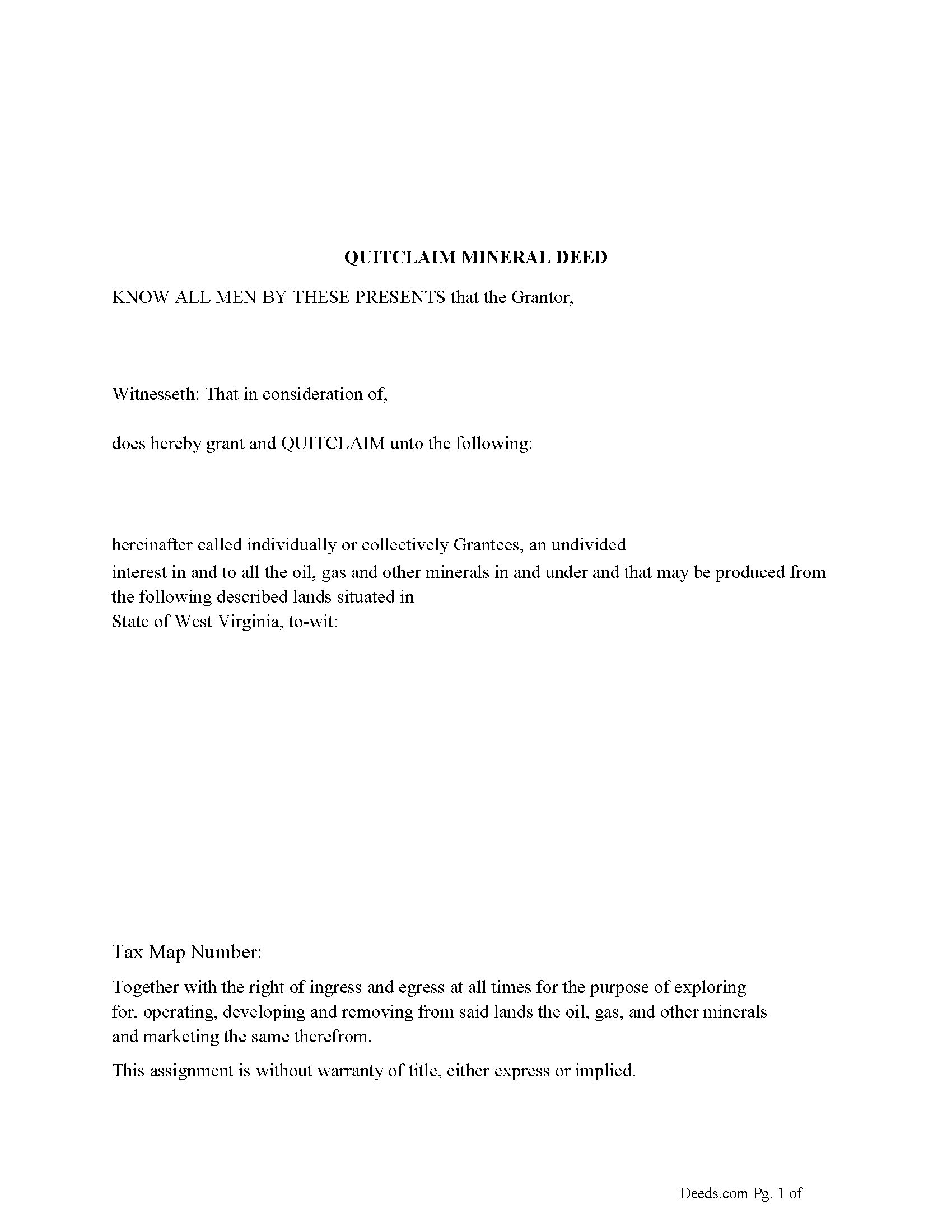
The General Mineral Deed in West Virginia Quitclaims oil, gas, and mineral rights from the grantor to the grantee. THIS IS NOT A LEASE. There are no Exceptions or Reservations included.
The transfer includes the oil, gas and other minerals of every kind and nature. The Grantor can stipulate the percentage of Mineral Rights the Grantee will receive.
This general mineral deed gives the grantee the right to access, for the purpose of mining, drilling, exploring, operating and developing said lands for oil, gas, and other minerals, and storing handling, transporting and marketing of such.
The seller, or grantor Quitclaims the mineral rights and does NOT accept responsibility to any discrepancy of title (This assignment is without warranty of title, either express or implied)
Uses: Mineral deeds with quitclaim are often used in situations where the grantor wants to quickly release any interest they might have in mineral rights, such as in settling estates, resolving disputes, clearing up uncertainties about ownership in a title's history or when mineral rights have previously been severed or fragmented from surface rights and cloud a title, making it difficult to transfer pr... More Information about the West Virginia Quitclaim Mineral Deed
Special Power of Attorney for the Purchase of Property
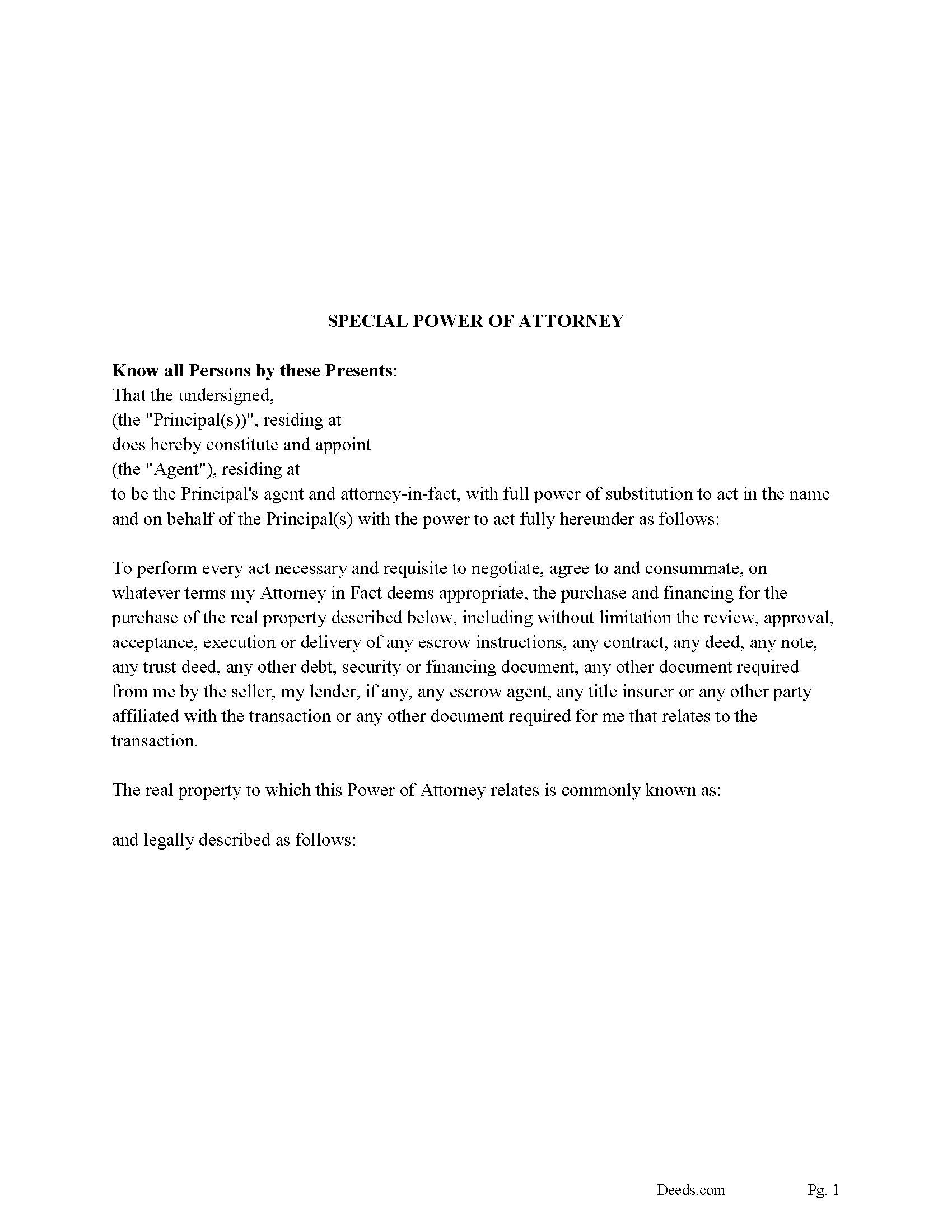
Use this form to empower your Attorney in Fact/Agent with the right to purchase a specific property, located in West Virginia. Your Agent can perform every act necessary for the purchase and financing of real property. This power of attorney is durable and is not affected by any subsequent disability or incapacity of the principal. Includes a special instructions section, where the agent's powers can be further defined to meet special needs. This Special Power of Attorney is governed by the laws of the State of West Virginia. Formatted to meet County recording requirements.
(West Virginia SPOA-Purchase Package includes form, guidelines, and completed example)... More Information about the West Virginia Special Power of Attorney for the Purchase of Property
Special Power of Attorney for the Sale of Property
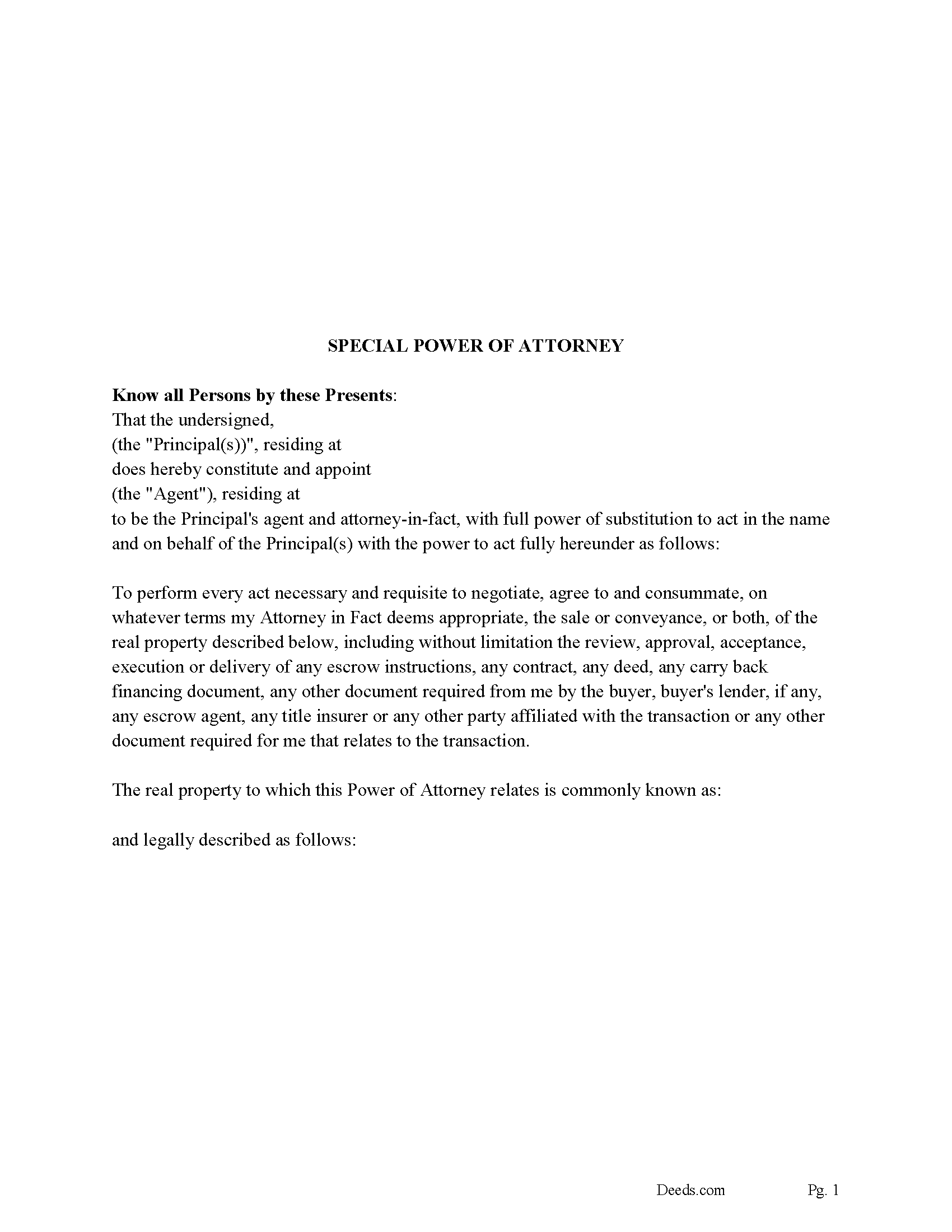
The principle/owner empowers an agent to perform all acts necessary in selling a specific property, that is located in West Virginia. Once complete it is recorded in the county where the property is located. It has a time frame that is set by an expiration date. This power of attorney is durable and is not affected by any subsequent disability or incapacity of the principal. Includes a special instructions section, where the agent's powers can be further defined to meet specific needs. This Special Power of Attorney is governed by the laws of the State of West Virginia.
(West Virginia SPOA-Sale Package includes form, guidelines, and completed example)... More Information about the West Virginia Special Power of Attorney for the Sale of Property
Memorandum and Notice of Agreement
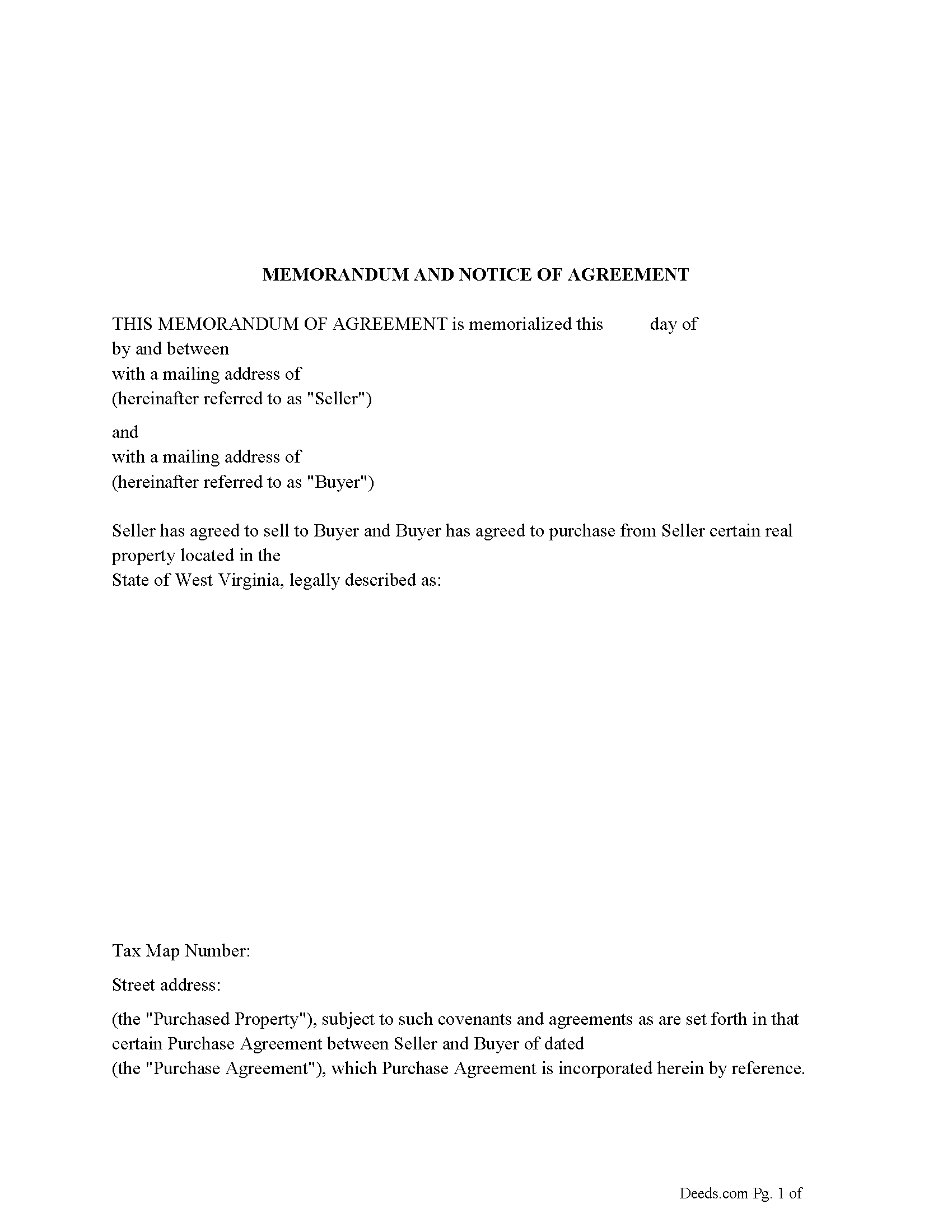
A "Memorandum of Purchase Agreement" commonly referred to as a "Memorandum of Agreement" (MOA) or "Memorandum of Understanding" (MOU) in the context of real estate, is used primarily as a means to provide public notice of an equitable interest in a real estate transaction without disclosing the full details of the purchase agreement. This document is particularly useful in transactions where the buyer and seller have agreed to terms but the final closing and transfer of the deed have not yet occurred. By recording this memorandum with the county recorder's office, the buyer establishes a public record of their interest in the property, which can protect against subsequent claims or liens by third parties.
Key Purposes of a Memorandum of Purchase Agreement:
1. Notice of Equitable Interest: The memorandum serves as notice to the public that the buyer has an equitable interest in the property due to the purchase agreement. This is important in protecting the buyer’s interest against claims by other parties who might otherwise be unaware of the agreement.
2. Protection During the Closing Process: Real estate transactions can involve a lengthy closing process, including financ... More Information about the West Virginia Memorandum and Notice of Agreement
Disclaimer of Interest
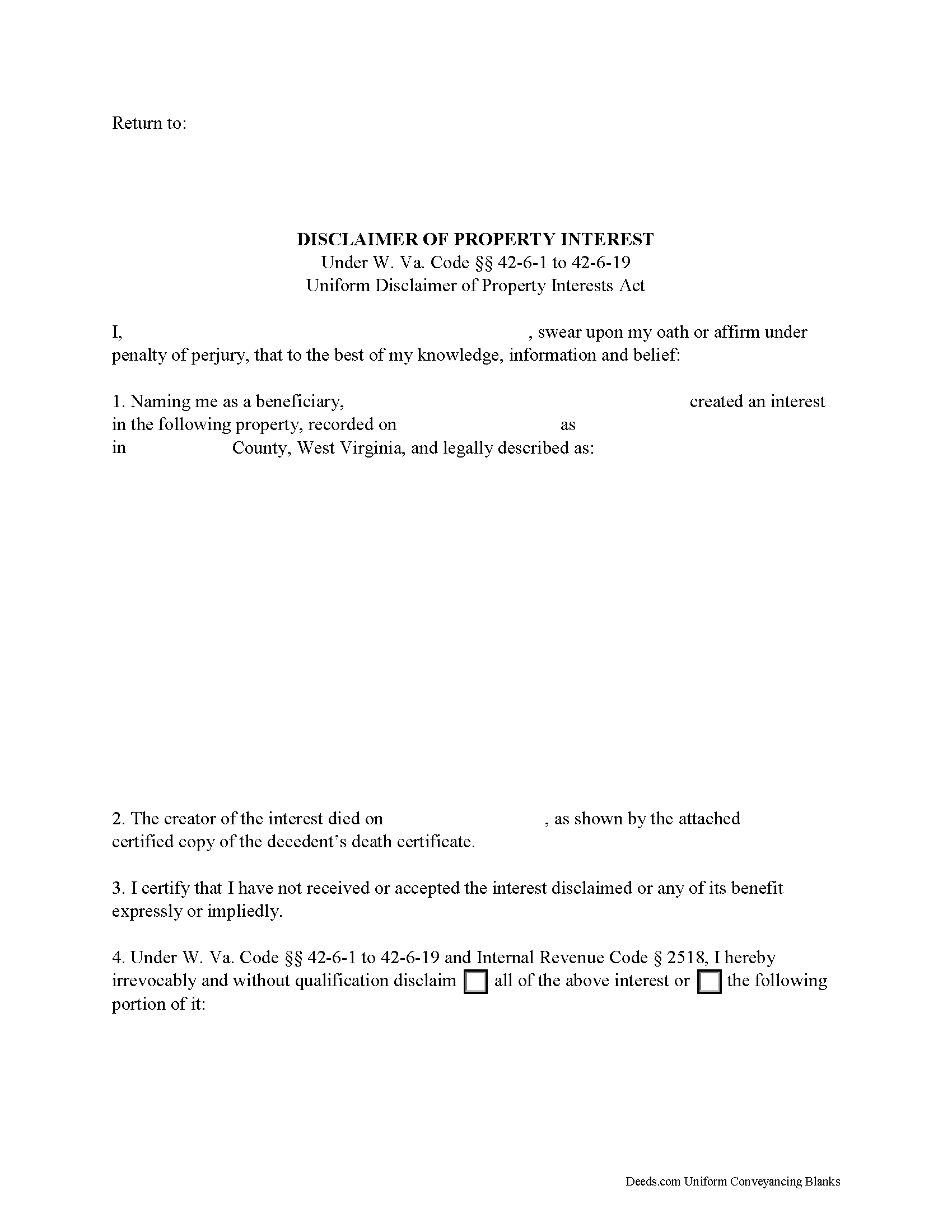
Under the West Virginia Statutes, the beneficiary of an interest in property may renounce the gift, either in part or in full (W. Va. Code 42-6-1 to 42-6-19 Uniform Disclaimer of Property Interests Act). Note that the option to disclaim is only available to beneficiaries who have not acted in any way to indicate acceptance or ownership of the interest ( 42-6-13).
The disclaimer must be in writing and include a description of the interest, a declaration of intent to disclaim all or a defined portion of the interest, and be signed by the disclaimant ( 42-6-5 (c)).
Deliver the disclaimer within nine months of the transfer (e.g., the death of the creator of the interest) to the personal representative of the decedent's estate or the trustee, or file it with the court having authority to appoint such a person or to enforce the trust ( 42-6-12). If real property is involved, record a copy of the disclaimer in the office of the clerk of county commission in the county where the property is located in order to avoid any ambiguity regarding the chain of title ( 42-6-15).
A disclaimer is irrevocable and binding for the disclaiming party and his or her creditors ( 42-6-5), so b... More Information about the West Virginia Disclaimer of Interest
Certification of Trust
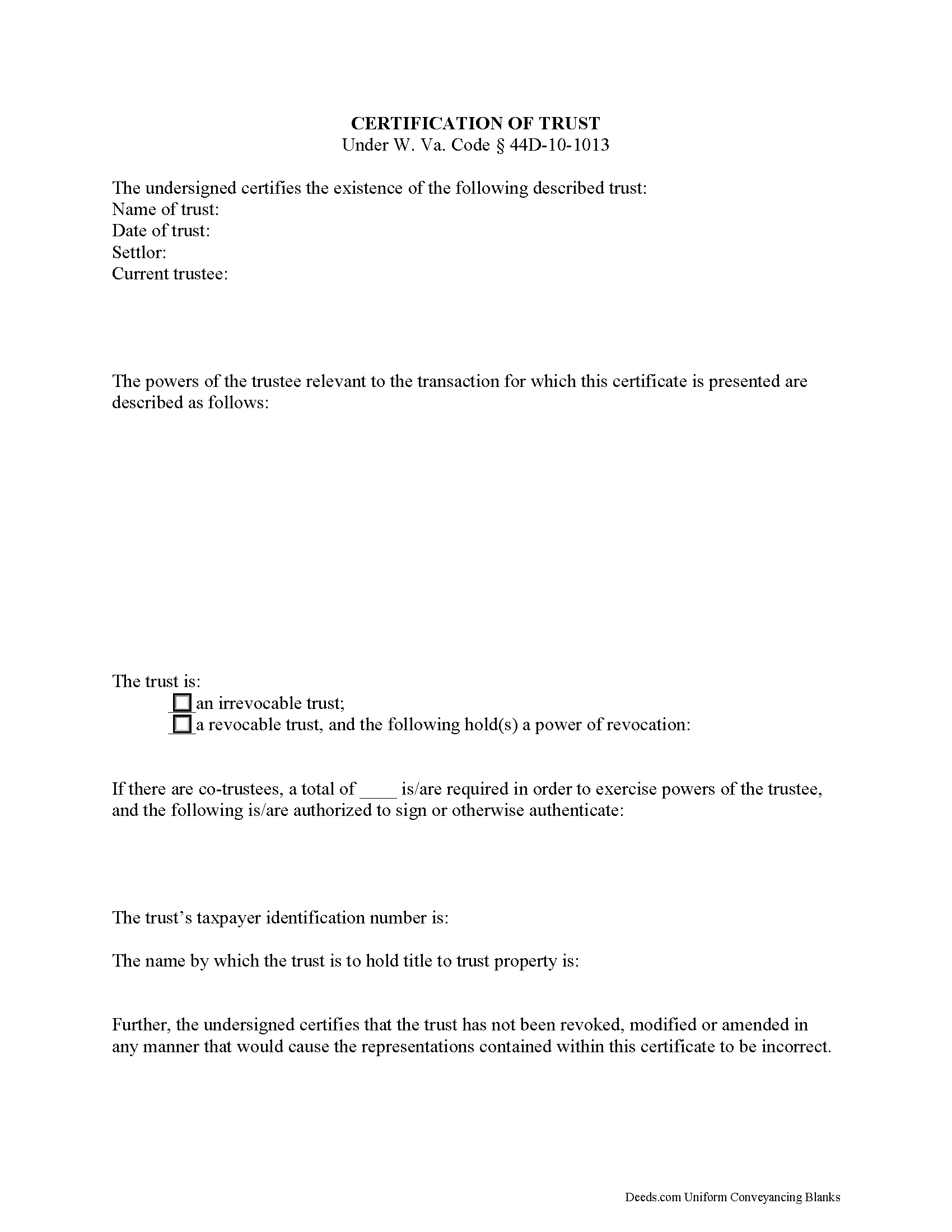
The certification of trust is part of the Uniform Trust Code, codified in West Virginia at 44D-10-1013, and provides protection for parties doing business with trustees. The document "need not contain the dispositive terms of a trust" ( 44D-10-1013(d)) and, in West Virginia, is generally not recorded with land records. Rather, the certification is presented to third parties such as banks or other financial institutions doing business with a trustee.
Executed by any trustee, the certificate contains only the pertinent information required for the business at hand and is a basic summary of the trust instrument. It states that the trust exists and that it has not been revoked or modified in a way that would invalidate the information presented within. In addition, it requires the name of each settlor and acting trustee; the trustee's relevant powers; the name of anyone having a power to revoke the trust; the trust's taxpayer identification number; and the name by which the trust vests title to property. The form also details the signing authority of co-trustees, if applicable.
Each situation is unique, so contact an attorney with questions about the certification of trust or a... More Information about the West Virginia Certification of Trust
Memorandum of Trust
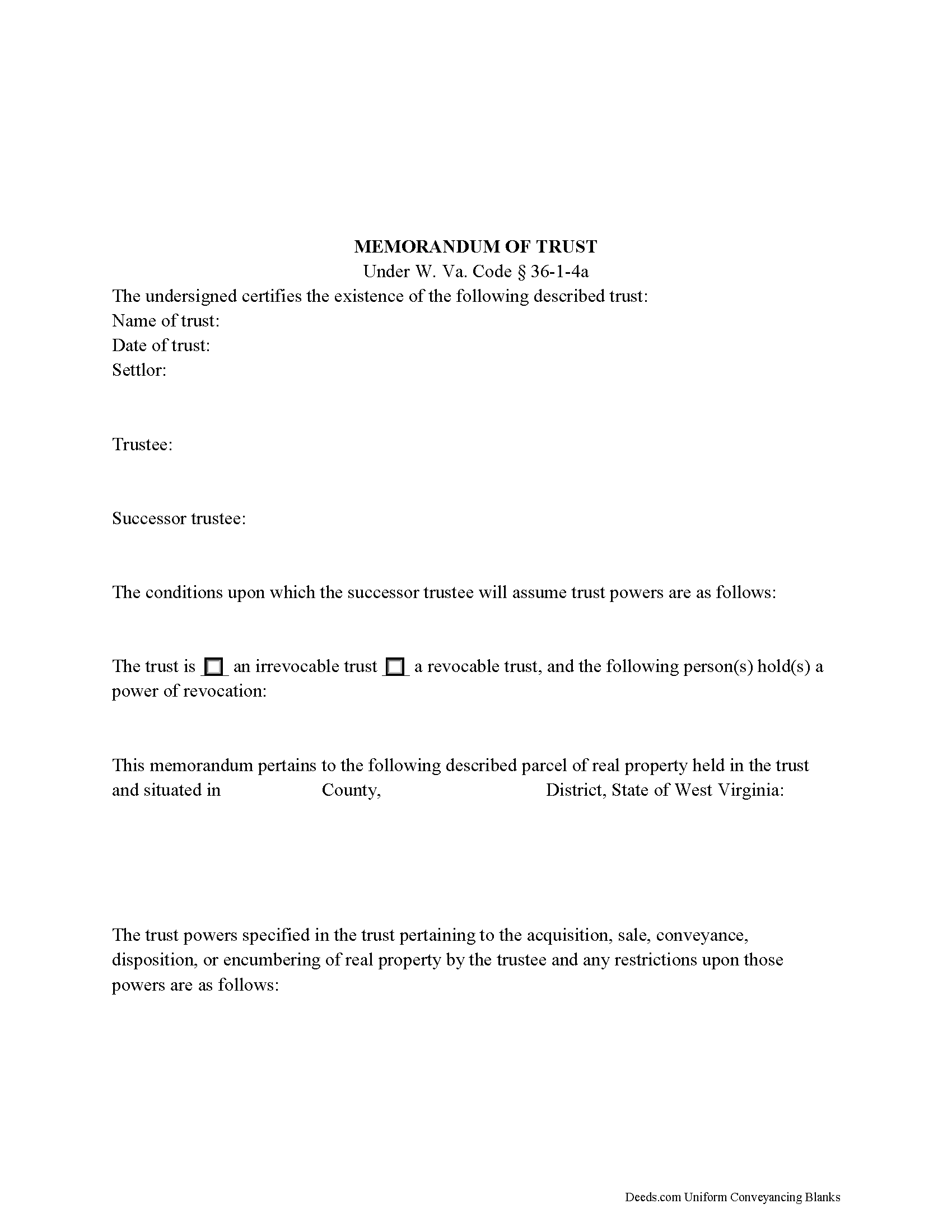
The memorandum of trust, codified under the Estates and Trusts chapter of the West Virginia Code at 36-1-4a is executed jointly by all acting trustees and living settlors of a trust. It is recorded in the land records with an acquisition and/or conveyance of real property by a trust in order to maintain a clear account for potential title examinations.
A memorandum contains a statement that the trust exists and the date of the trust; the names of each settlor, current trustee, and successor trustee; the conditions under which the successor assumes trustee powers; and whether or not the trust is revocable. The form also requires a verbatim accounting of the trustee's powers "relative to the acquisition, sale, disposition, or encumbering of real property ... or the conveyance or disposition of real property," depending on the situation, and any restrictions on those powers (W. Va. Code 36-1-4a(a)(2)(iv)). Due to the nature of the transaction for which the memorandum is recorded, a legal description of the subject property is also required. The memorandum may also include the entire text "of any or all of the provisions of the trust" ( 36-1-4a(b)).
Each case is unique, so con... More Information about the West Virginia Memorandum of Trust
Notice of Lis Pendens
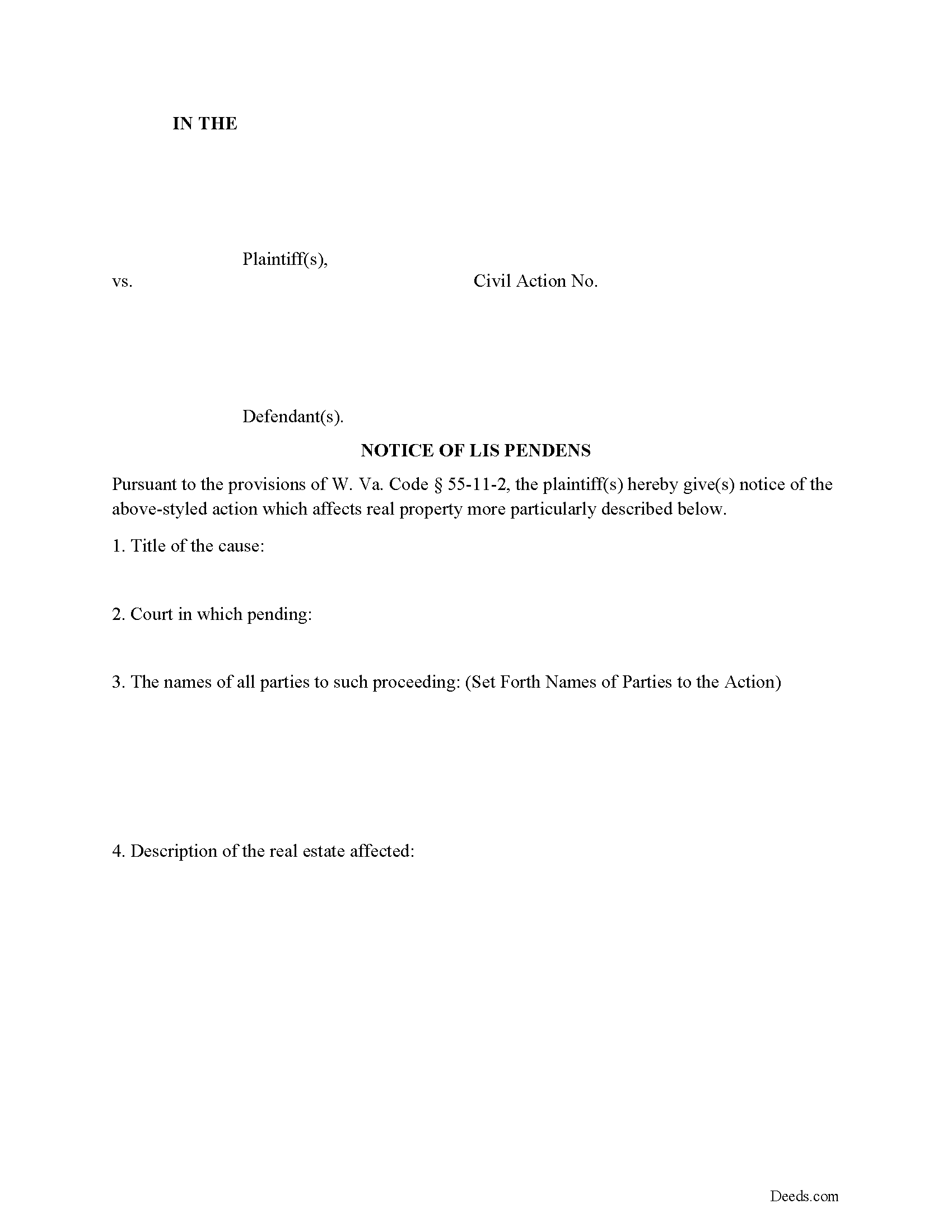
When a suit is filed that affects title to real property a Lis Pendens must be recorded to provide constructive notice to would be buyers or encumbrancers. Such Lis Pendens must be recorded in the County Clerks Office where the property is located to become effective. If the property is located in more than one county then a Lis Pendens shall be recorded in the (Lis Pendens record) of each county, (which will become public record). (WV Code 55-11-1)
The Lis Pendens document contains:
The Court of the pending case
Title of the Cause of the case
Names of parties to the case
Legal Description of property affected
Object of the case
Names of the parties whose estate is intended to be affected by outcome of the case
[Notice of Lis Pendens SECTION 15-11-2]
(West Virginia Notice of LP Package includes form, guidelines, and completed example)
... More Information about the West Virginia Notice of Lis Pendens
Release of Lis Pendens
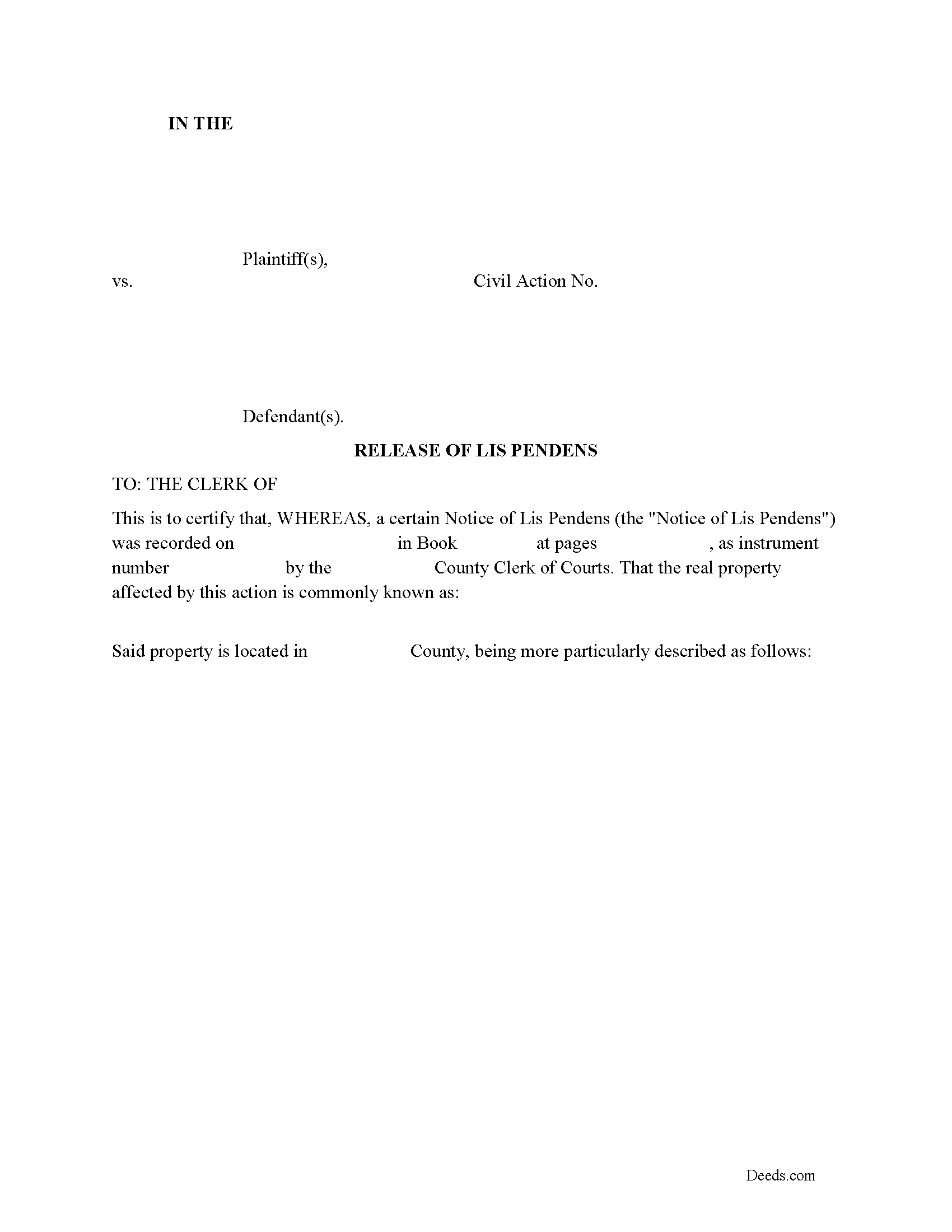
Use this form to release a previously recorded Lis Pendens.
(West Virginia Release of LP Package includes form, guidelines, and completed example)... More Information about the West Virginia Release of Lis Pendens